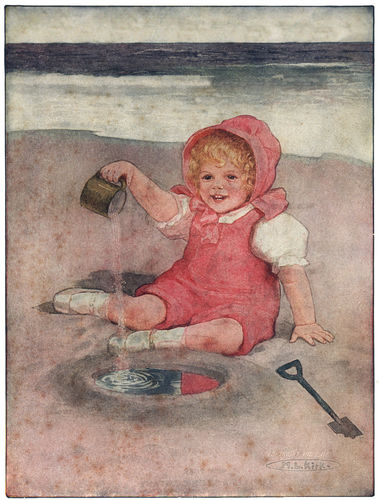
LITTLE DROPS OF WATER, LITTLE GRAINS OF SAND.
Transcriber's Note:
The cover image was created by the transcriber and is placed in the public domain.

LITTLE DROPS OF WATER, LITTLE GRAINS OF SAND.
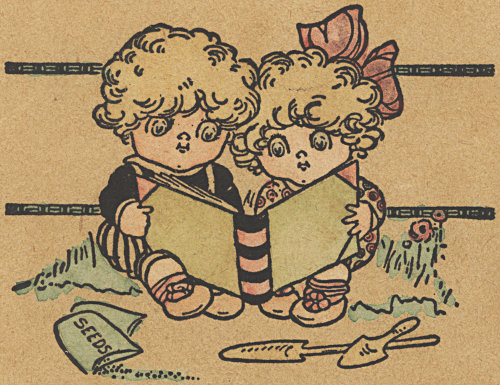

His real name was Willy. But because he was always on the look-out for any fun or mischief, Father and Mother called him “Wideawake” as well.
One sunny day he and his little friends went out to play cricket.
“I'm going to make a hundred runs!” cried Willy, as he took up the bat. But when he had made ten, Freddy bowled him out, and the other boys were glad it was their turn to go in.
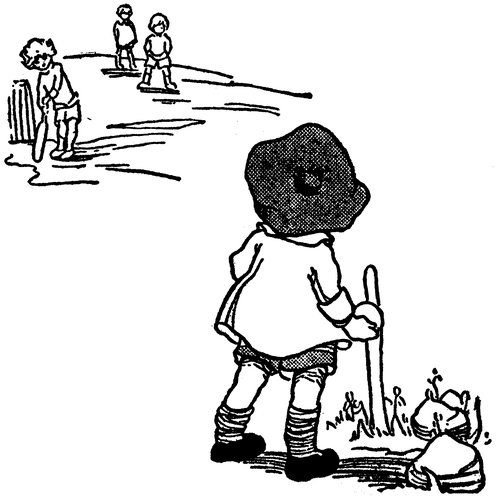
In the winter, father made a big slide, and Willy and the boys went down it as fast as they could go. When he fell half way down, Willy thought it great fun, and called to his snowman as he glided past, “Look at me old fellow! Don't you wish you could slide?”
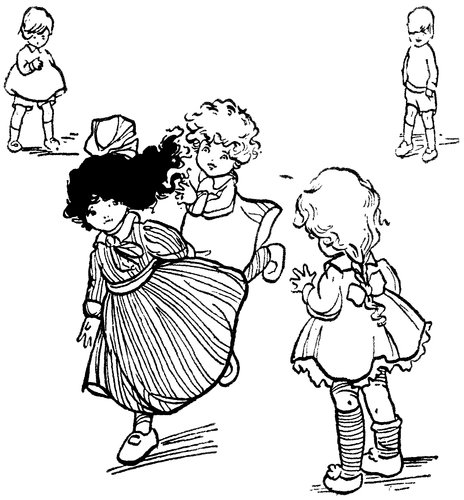
On his birthday he had a party. It was a merry time. They played “Blind Man's Buff,” and “Puss in the Corner,” and Willy always managed to catch the little girls by their long curls.
It was spring when Wideawake Willy went exploring. He shot his Teddy Bear, and tied it up in a scarlet handkerchief, for he knew explorers ate bears. Then he stuck a long feather in his hat, and strode gaily down the road. Presently he came to a big house. The door was open, and a lady asked him to go in. She showed him all sorts of wonderful things. What he liked best was Chin Chan, the Chinese boy, whose long pig-tail touched the floor. The lady told Willy that in China he lived in a boat, and helped his mother look after the chickens.
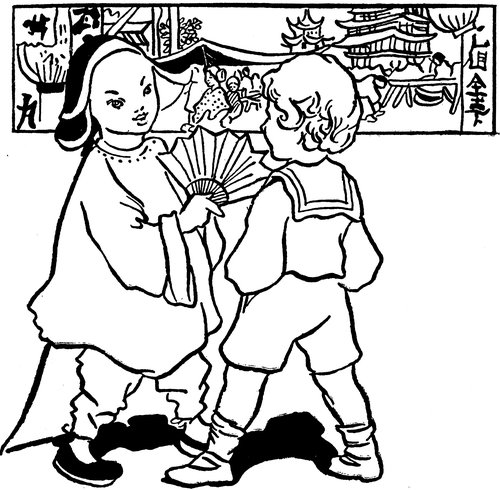
After seeing other Chinese people, he went home and told his mother what strange things he had seen.
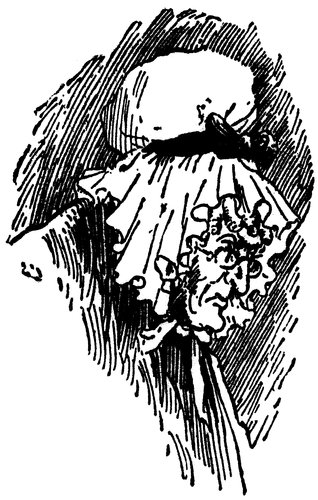
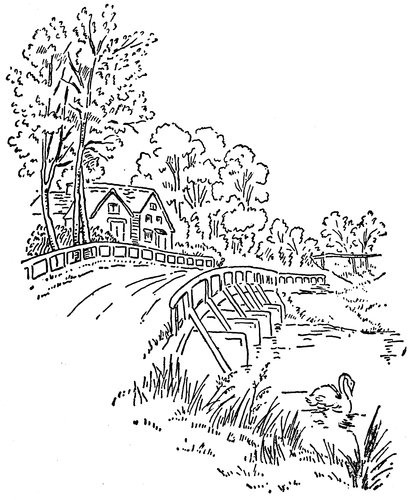
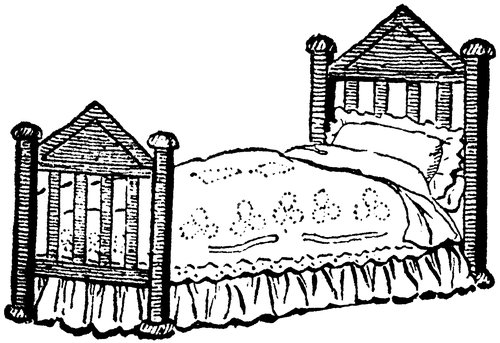
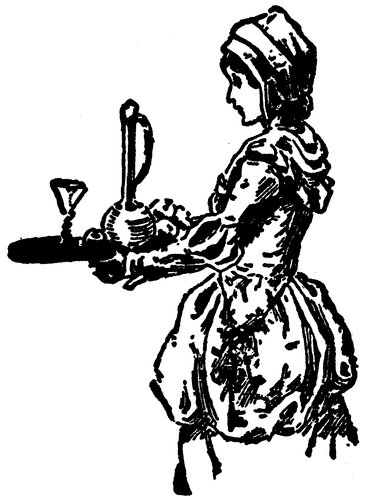
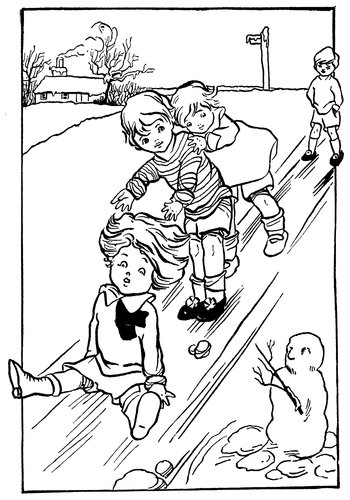
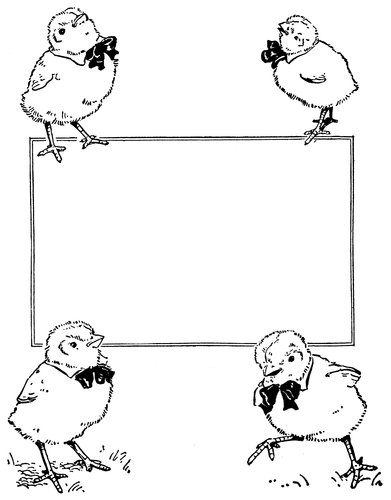
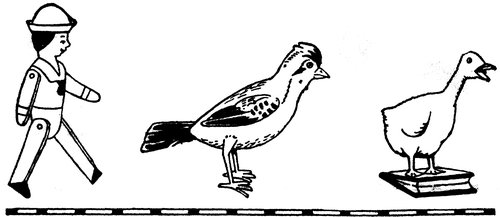
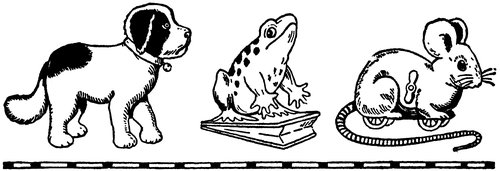
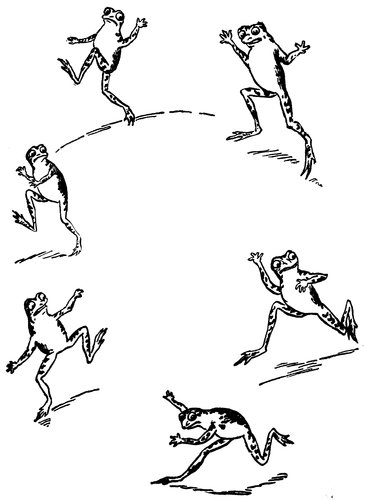
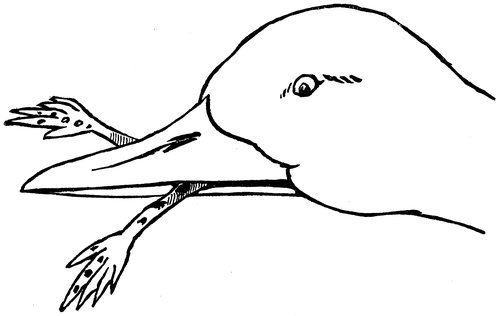
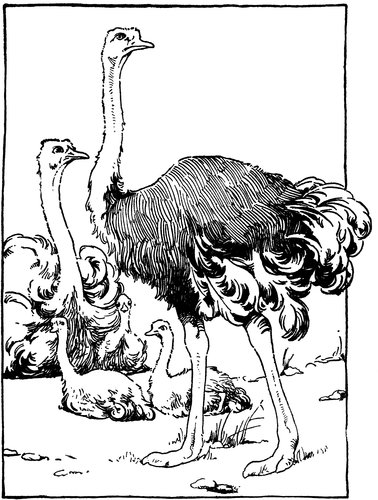
Mr. and Mrs. Ostrich and their Children.
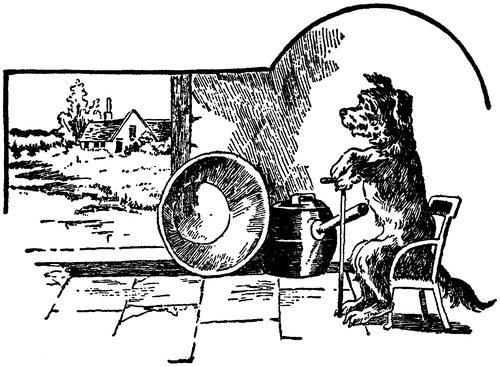
Frisk was a dear little dog. He belonged to Mistress Molly.
One morning Molly said, “Now Frisk, I am going to the town, and you must stay and look after the house, for Mother is going out too.”
Frisk sat down in his little chair, and held his walking stick between his paws.
“No one shall steal the dinner while I am here,” he said. “Bow, wow!”
On her way to the town, Molly saw her cousin Tommy leaning over a gate.
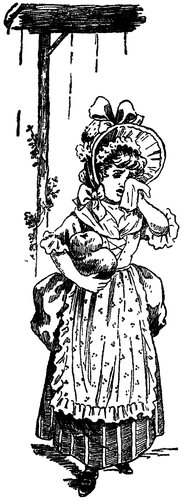
“Oh, Tommy!” she said, “If you are passing our house, please look in and see how Frisk is getting on.”
And Tommy ran off at once.
Frisk was glad to see Tommy, who gave him a good drink of water from a tub.
When Molly reached the town she went into the baker's shop to buy a loaf of bread.
But when she put her hand in her pocket she found her purse had gone!
“Don't cry, my dear,” said the baker.
And he left his shop, and went with Molly down the road.
Very soon they found the purse with all the money quite safe inside.
Then Molly saw a shop with “SALE” printed in the window, and went in.
“Good morning, ma'am!” said the shopman. “What can I get for you?”
“I want some stockings, please,” said Molly.
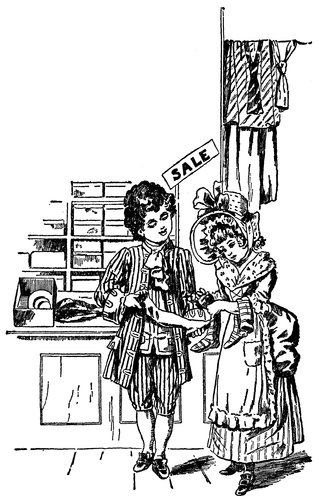
“How do you like these?” said the shopman. “They are only one shilling the pair, because it is sale time!”
“They are lovely!” said Molly, “And the scarlet stripes just match my dress! Please make them into a tiny parcel, and I will put them in my pocket.” Then she paid her money, and set off home.
And what had Frisk been doing all this time?
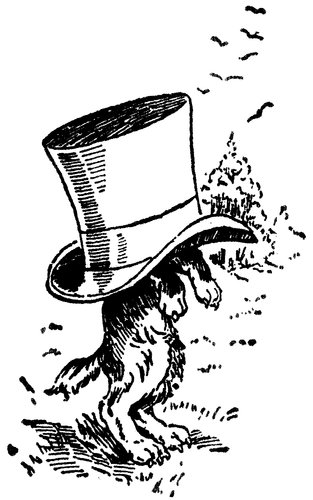
He soon grew tired of looking after the dinner, and spied his master's hat.
“Bow wow!” he said. “What fun!”
He poked his head into the hat, and though it came right down on to his shoulders he didn't mind a bit.
He hopped into the garden on his hind legs, and when the birds saw him they thought it was a scarecrow come to frighten them away!
“Bow wow!” said Frisk. “I'm hungry!” He went back indoors, pushed the lid off the pot, and dragged out a bone. How good it was!
Then a tiny mouse scampered past, and Frisk pounced on it and killed it.
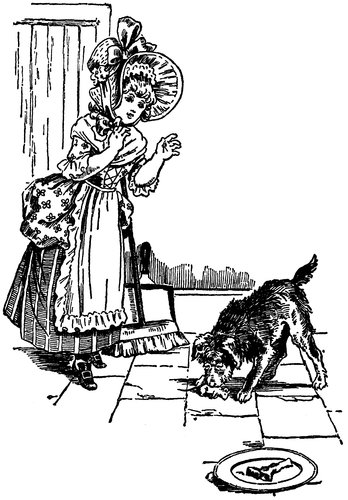
“Oh, Frisk, Frisk!” cried Molly, when she came home. “You naughty dog! I shall never be able to leave you in charge again!”
“Bow, wow!” cried Frisk. “Bow, wow! I'm very glad. For I'd much rather go to the town with you!”
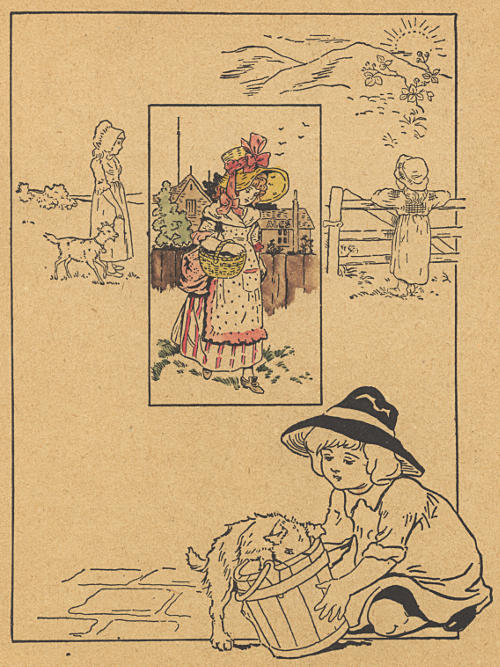
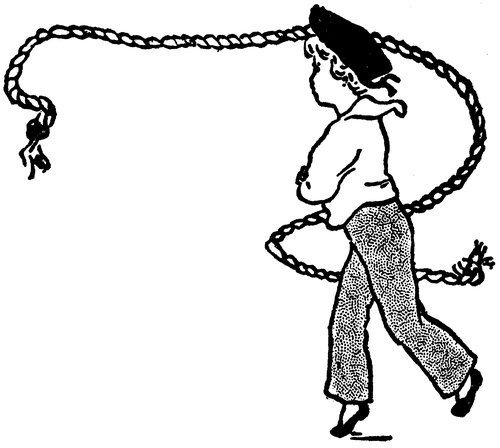
Jack always said he should be a sailor when he grew up.
No toy ever pleased him so much as a boat, and he was constantly imitating the ways of sailors, from dancing a hornpipe, down to floating about in a big round tub on the little stream which ran at the end of the garden.
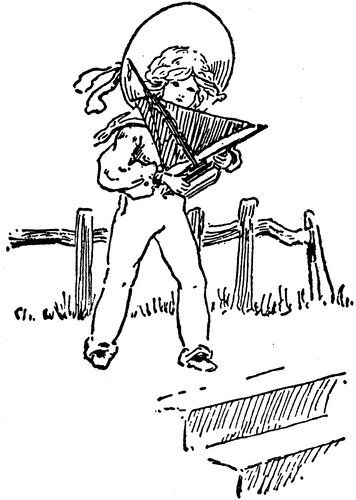
“Wouldn't it be too lovely for words,” he said on one occasion when he was taking his sisters for a voyage in his tub-ship, “if we could go in a real big boat, and sail away across the sea?”
And that is exactly what they did do! For one summer day, Father and Mother and the children, Elsie, Doris and Jack, all went on board a big boat and steamed across the channel to France for a long holiday.
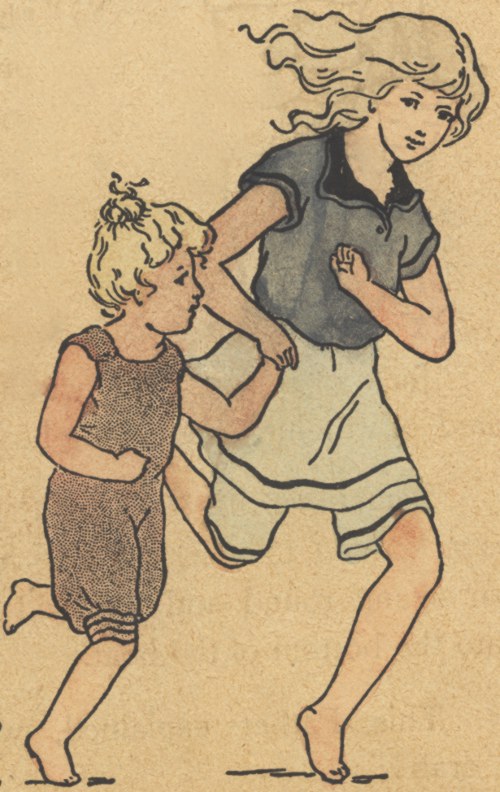
Oh! what a glorious time they had! What fun the bathing was, undressing in the little rocky caves and running down the firm sand, and then tumbling into the water with shouts of joy. Then afterwards they paddled and dug in the sands, and searched for shells and seaweed, and thoroughly enjoyed themselves the whole day long.
There was so much to interest them, too, in the little French village, and they were delighted with the quaint dresses of the peasants.
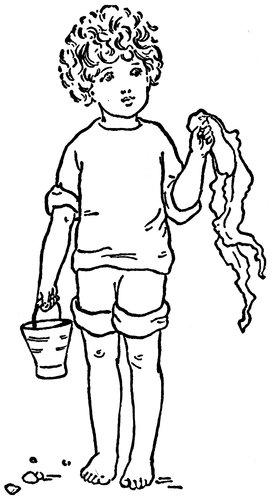
One girl came to bring them fruit and vegetables, and the children thought how pretty she looked in her snowy cap, coloured skirt and wooden shoes, as she lifted her little sister to look for father's boat.
Jack, of course, was just in his glory, and never tired of watching the fishing boats sailing out to sea.
Sometimes he went on the water himself, and soon learned to row, tho' the first time he tried, his oar swung round and knocked him head over heels into the bottom of the boat.
This, Father explained, was called “catching a crab!”
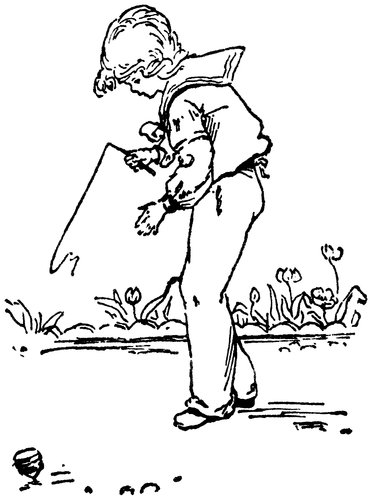
Afterwards they made a huge sandcastle, and Jackie sat at the top of it, singing: “I'm the King of the Castle!” at the top of his voice.
Presently he began to examine some shells and treasures which he had been collecting in his pail, and was so intent on this, that he did not notice how quickly the tide had come in.
When he looked up he found, somewhat to his horror, that he was quite surrounded by water.
The castle was soon washed away; but not before the “King” was rescued from his perilous position.
Father waded out, and pick-a-backed him safely ashore.
That was the little sailor's first adventure at sea!
The last time for Jackie to sail his boat came all too soon for him, and the next day the children found themselves back in old England once more.
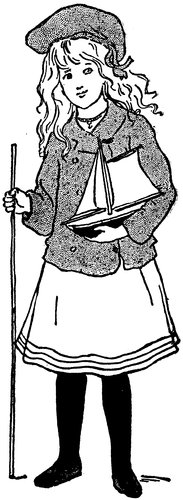
But they hope some day to return for another delightful holiday to the dear little French fishing village where they spent such a pleasant time.
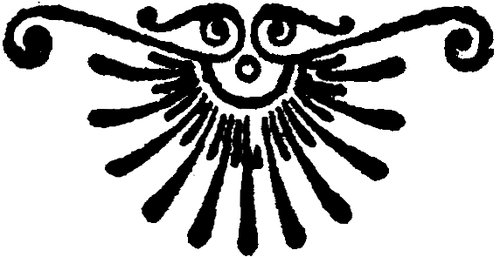
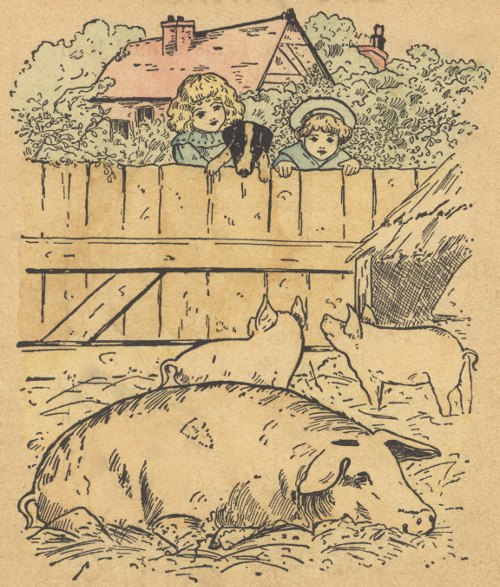
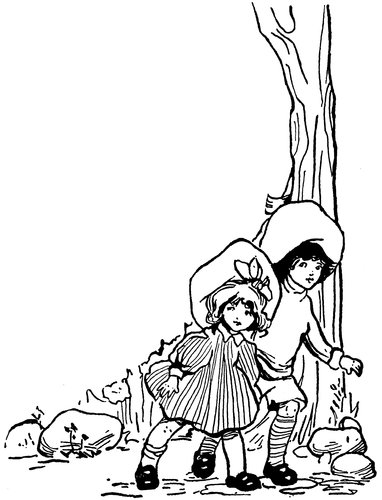
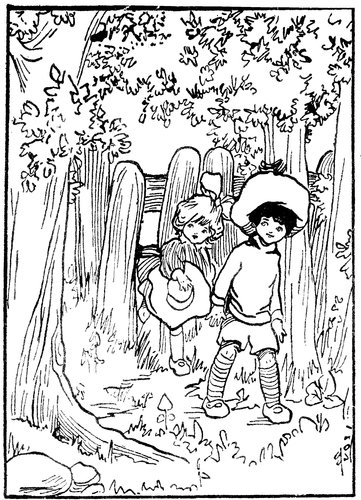
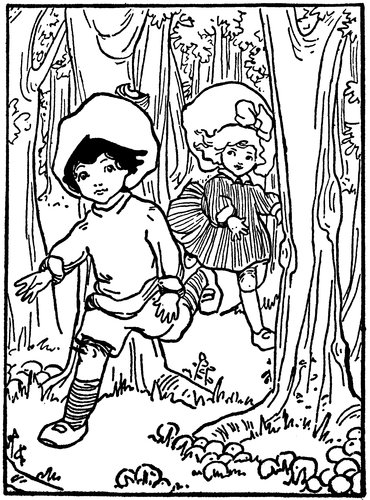
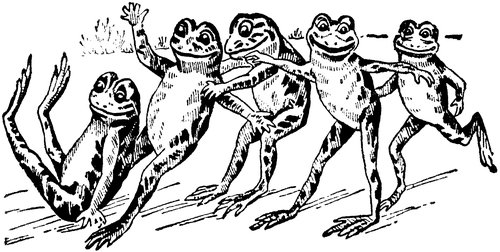
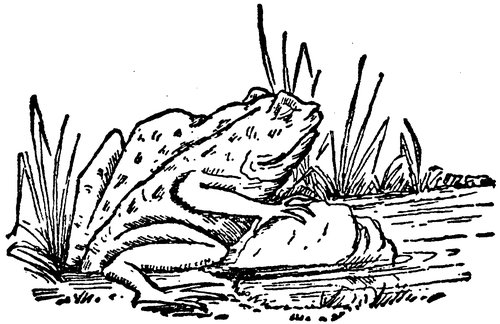
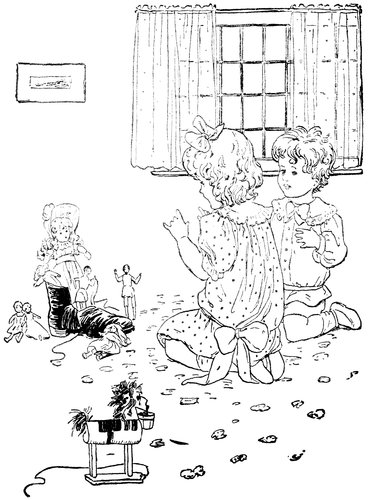
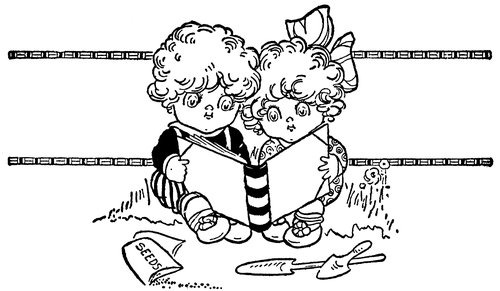
Dickie and Daisy sat on the grass reading. They had been gardening, and were rather hot.
“Let's go to the pond,” said Dickie. “Nurse isn't here to say 'don't.'”
“Let's,” agreed Daisy. She always agreed with Dickie.
“We'll get father's rod and line, and catch some fish,” said Dickie. So when no one was looking they got the things and ran to the water.
“You have the rod,” said Dickie, “and I'll have the hook. Don't make a noise or the fish won't come.” They sat quite quiet till there came a big tug at Daisy's rod, so big that it dragged her to the edge of the pond.
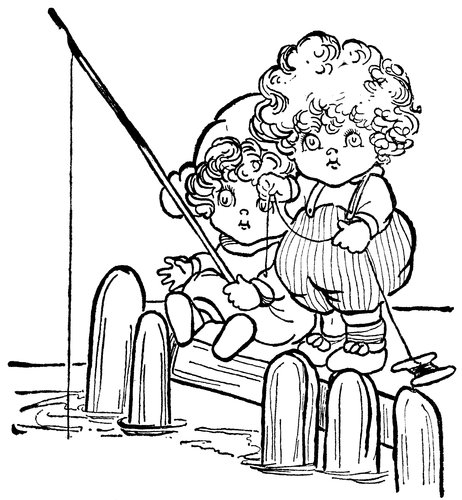
“Oh, Dickie,” she cried, “help me! I b'lieve I've caught a whale!”
But before Dickie could catch hold of her, in she went. The water ran into her eyes and mouth, and washed her curls quite straight.
Dickie was dreadfully frightened. He made a grab at her, and she made a grab at him. By the time she was safely on land both were nearly as wet as the other. Father's rod had disappeared.
“I think we'd better go home,” sobbed Daisy.
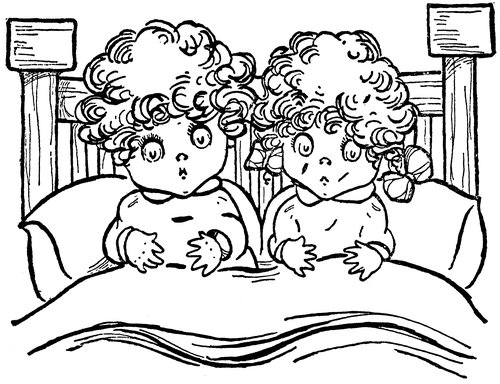
Mother didn't wait to ask questions. She hurried them into nice warm nighties, and popped them into bed. Dickie was soon all right, but Daisy caught a cold. When Dickie got up he put on his spectacles and brought out his watch. He put his fingers on the little thumper in her wrist.
“You must stay in bed” he said, “and take Lemon Squash. Lemon is good for coughs, so you won't get one, and Squash will squash all the other poorliness out of you.”
When Father heard he was very cross. He said, “If you go near the pond again I shall buy another kind of rod, and use it too.”
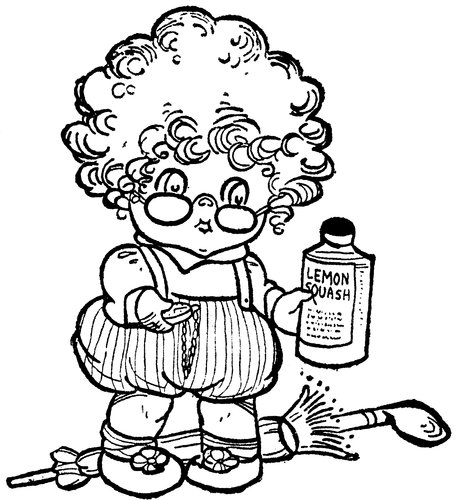
But they had had enough of water, and didn't enjoy their Saturday tub for a long time.
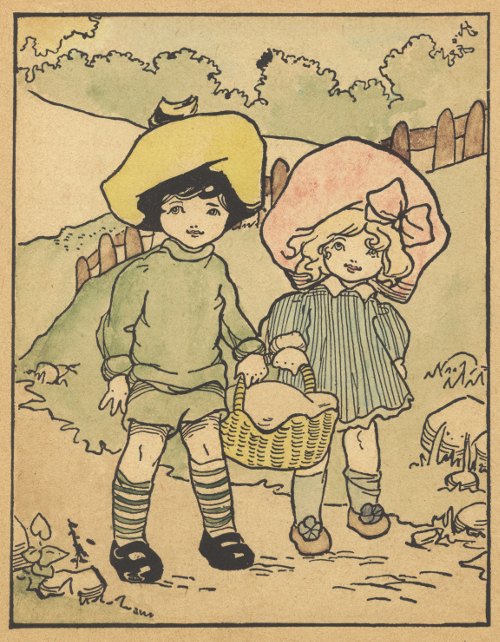
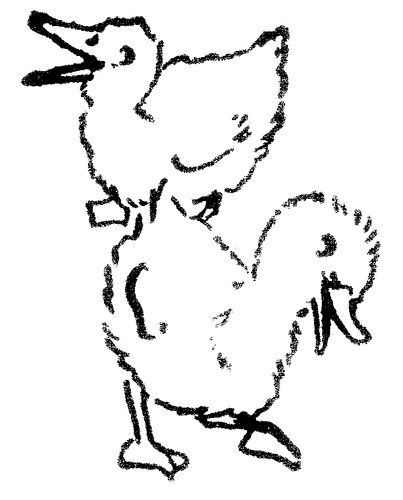
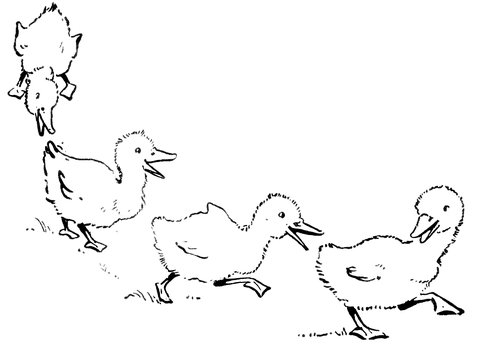
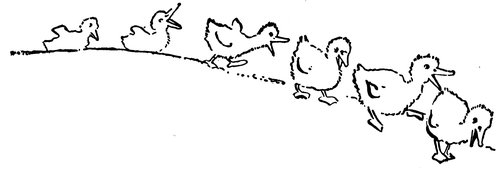
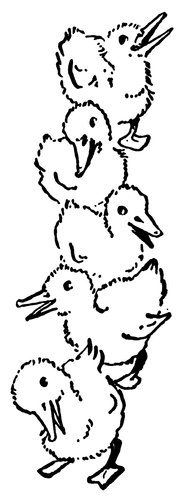
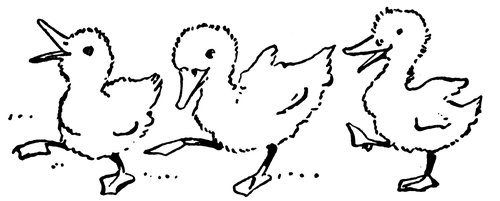
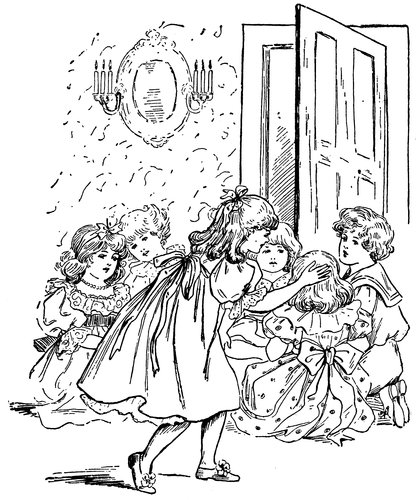
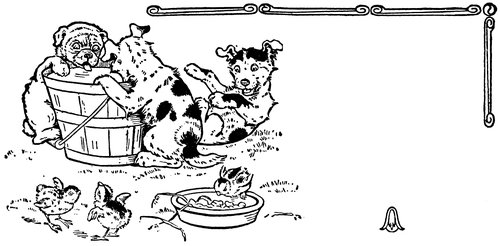
“Sulky Sammy,”—that's what they called me. I live in a stable, in a big farmyard, and everybody used to say I was the most disagreeable little puppy dog they knew!
One morning I was having a drink of water when two other little pups came along.
“Will you come and have a game?” they said.
But I had a fit of the sulks on, and didn't want to play with anyone, so I frowned, and said nothing. Close by Chick was having breakfast with her sisters, and I heard her say, “There's Sulky Sammy—disagreeable again!”
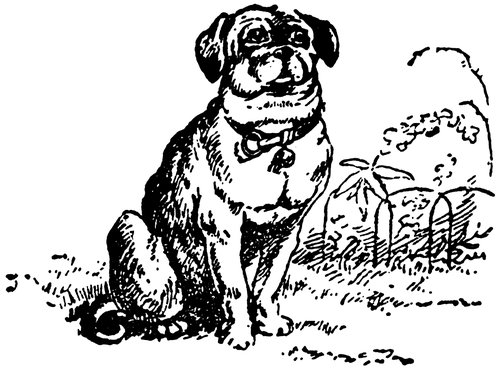
I don't like Chick. Mother often says to me, “Oh, Sammy! How I wish you were as sweet and gentle as Chick!” And Master Mousie tells his friends Mrs. Puss, and her three little kittens, long stories of Chick's goodness, and my naughtiness and sulks.
One day I chased Chick out of the farmyard, and left her all alone in a big field.
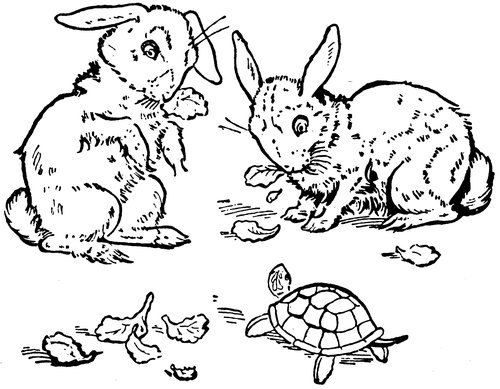
I hoped she would never come back any more, but Mr. Tortoise found her, and asked Bunny and his brother to take her home. That nasty Bunny told everybody what I had done. So Mr. Turkey chased me out of the farmyard. In a field I met such a funny man. Two birds sat on his arms, and one said, “Everyone would be quite fond of Sammy if he only left off being disagreeable!” I trotted home, and began to try at once. Nobody ever calls me “Sulky Sammy” now.
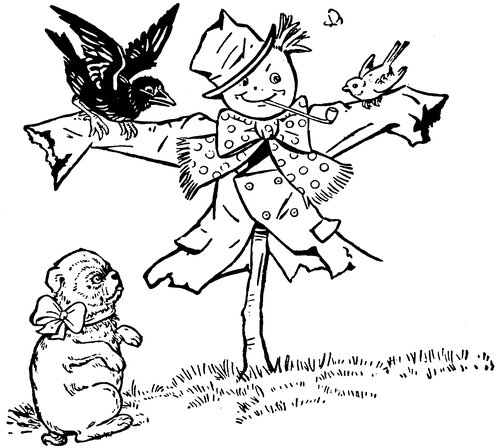
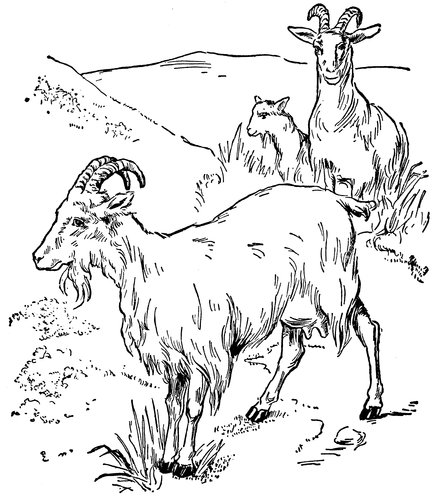
Mountain Goats.
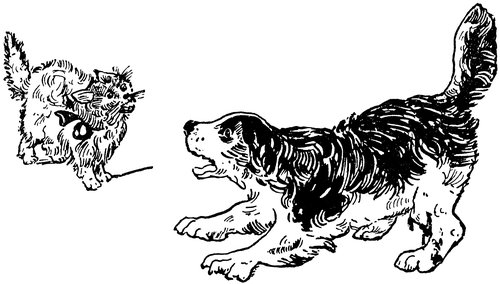
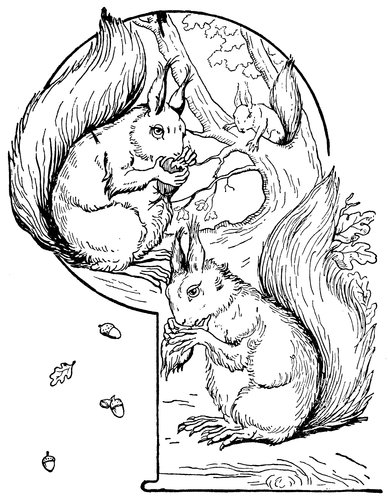
Squirrels
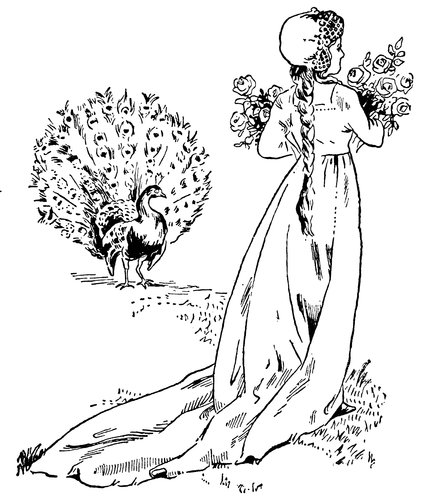
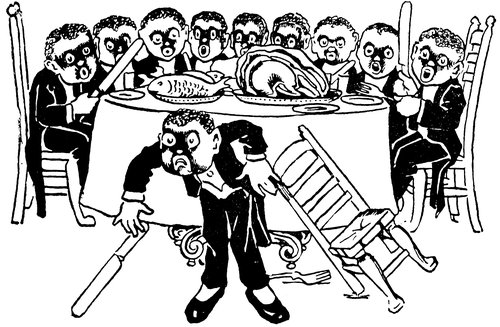
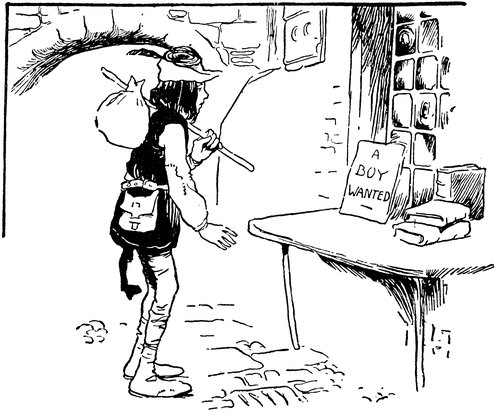
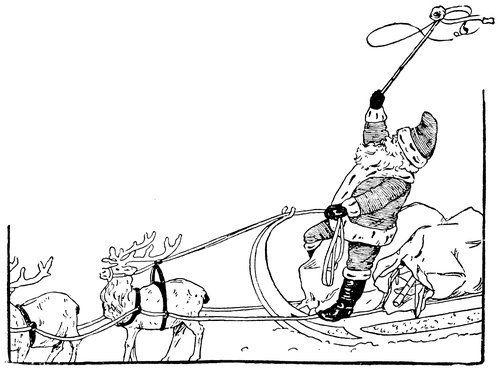
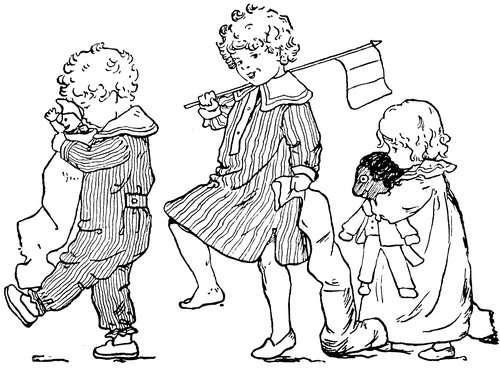
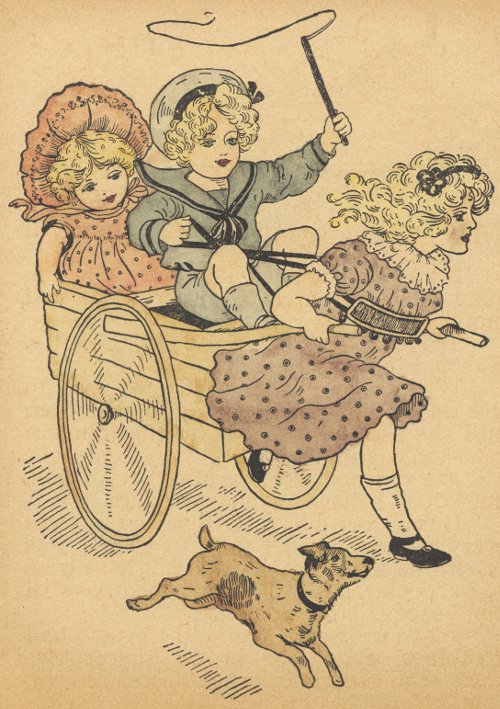
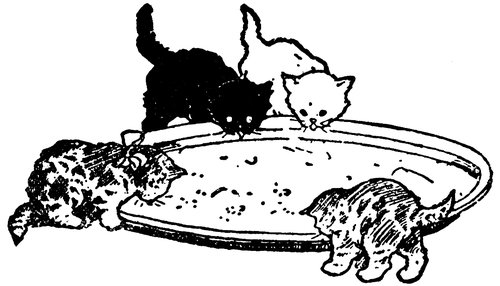
My name is Snowball—Miss Snowball Kitkin.
I was called Snowball because I am quite white all over, and very soft and fluffy.
There are four of us altogether—Kitty, Tabby, Fluffy, and me.
When we were very little we used to live up in the stable loft with our Mother, and she used to teach us all the things a cat should know.
We did not like learning very much, but I don't believe anyone ever does.
It was horrid having to wash our faces every morning, and I used to wish I was black like Kitty, then I need not have been so particular, but Mother said that was all nonsense.
When we were clean and tidy, we had breakfast out of the brown saucer; we liked that, especially when Cook remembered to sweeten the milk with lumps of sugar.
As soon as we were old enough to go out by ourselves, we had fine fun.
But one day Tabby very nearly got himself into trouble.
Tabby, you see, was rather a bold, bad kitten; he was always wanting to fight people, and one day he thought it would be splendid to have a quarrel with Mike.
Mike was the black and white fox terrier, who thought no end of himself; but Tabby did not care a bit what he thought, so he just stood in front of him, stuck up his tail, and—spat as hard as he could.
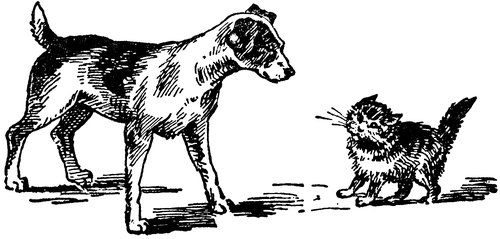
This was not at all what Mike was accustomed to, and he got stiff all over, and then—he growled and showed his teeth. In another minute I think he would have gone for Tabby, had not Miss Daisy picked him up and carried him off. Tabby never told me, but I believe he was very glad to find himself out of Mike's reach.
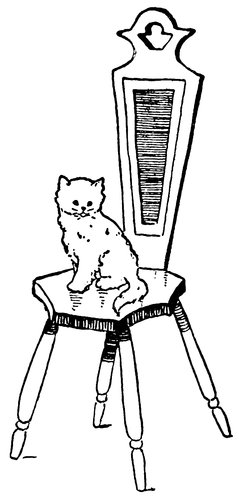
As this story is told by me, I thought you would like to have a picture of me, taken all by myself, so what do you think I did?
I knew Miss Daisy had been given a dear little camera on her birthday, and that she was making pictures with it all day long, so one morning I went and sat on the wooden chair in the hall, just where the sun was shining very brightly. I sat quite still, and then Miss Daisy and her camera came along, as I felt sure they would, and I had my likeness taken, and—here it is.
Oh how proud I was of myself after that, and Miss Daisy was so pleased with me for sitting so still that she gave me a beautiful blue ribbon to wear round my neck.
Alas! that blue ribbon was the cause of great trouble to me.
I just jumped on the kitchen table to look at myself in the glass, and—I upset a bowl of milk that Cook had put ready for a pudding.
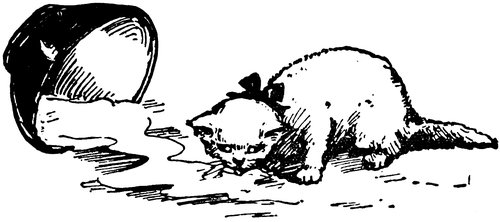
I jumped after it, and—oh what a lovely feast I had; but my ribbon got all splashed and wet—I was in such a hurry—and that was how Cook found out it was I who had upset the milk. She would not let me go into the kitchen for three whole days afterwards.
I was very dull for those three days. You see, there were mice and all kinds of nice things in the kitchen, and my whiskers were growing fast, and that makes you feel that you want mice more than anything else almost.
On the third day I went and explored in Cook's bedroom.
All kinds of funny things I found in it, and oh! such lovely slippers to play with.
I took one of these slippers, one with a big bow on the toe. I took it and hid it in the garden, to punish Cook for being so angry with me. It was a very difficult thing for a kitten to do, I can tell you, and I had to rest many times on the way, but I did it, and then I went and sat in the sun and watched, and what do you think I saw? Why, that horrid person, Mike, must have seen all I did, for he went straight to where I had hidden it, and carried it off to Cook. She gives him bones; that is why he chums up to her. Oh, how I should have liked to have—scratched him.
I must not forget to tell you about Tabby and Fluffy and their “night out.”
It was in the summer time, and they had been playing all the evening on the lawn, and then they disappeared.
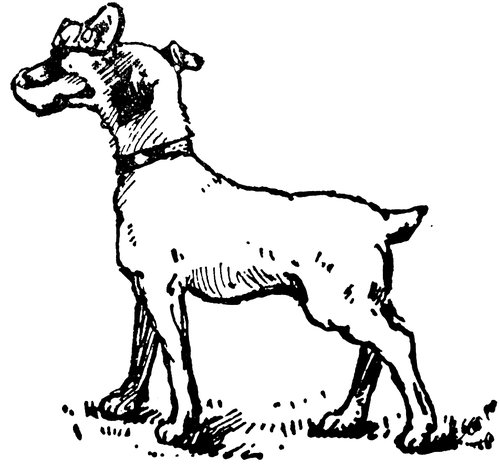
They never came in to supper, and they never came in to bed. We never saw a sign of them till the next morning, when they came back looking as proud as you please.
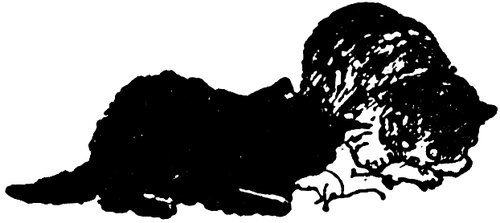
Then they told us what they had been doing. They had been having a mouse hunt in the kitchen.
They had hidden under the big armchair in which Cook sits on Sundays, and then, when it was all quite dark and quiet, they had watched the big hole by the store cupboard.
In a little while, two fat mice had popped out, and then—the hunt began.
“We caught them both,” said Fluffy. “We had one each. Oh, what a lovely time we had!”
Next time they go hunting, I am going, too.
One day Kitty and I had a most tremendous adventure. We went to the grand Show up in London.
The journey was not a bit nice, but we kept very close to each other, and shut our eyes up tight, and tried to pretend we were not shut up in a hamper, but under Cook's chair, waiting for the mice to come out.
When we got to the Show we felt a little strange, but we soon got used to the noise and all the people.
“We must look our best, Kitty, Miss Daisy said so,” I whispered. “We are much handsomer than the other cats here; let us show ourselves off.”
And we did.
Presently a lady came and pinned a big white card, with “First Prize” on it, right in front of us. We showed ourselves off more than ever after that.
This is our picture. Don't you think we deserved the First Prize?
I do!
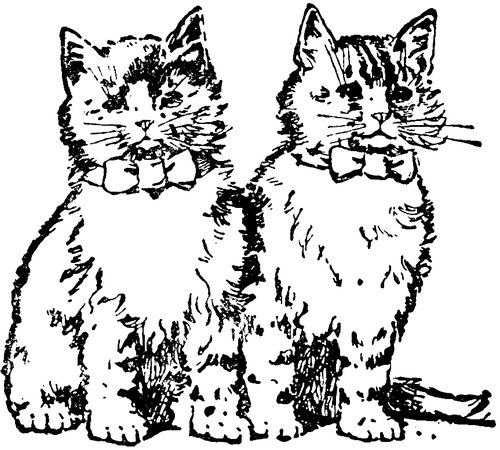
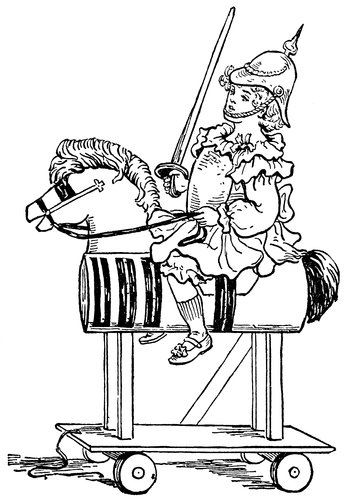
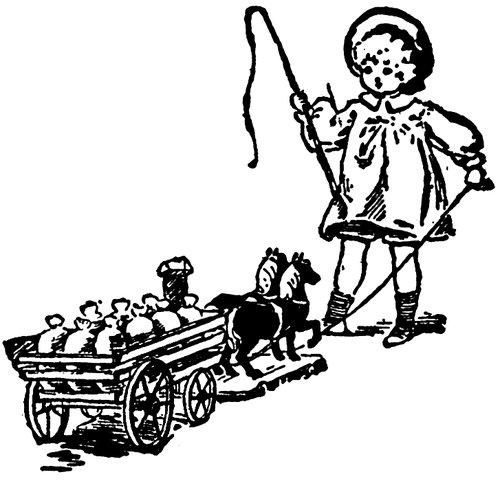
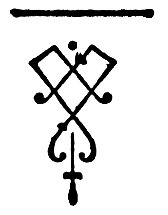
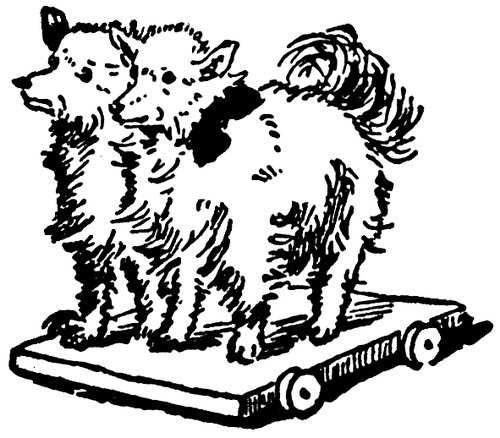
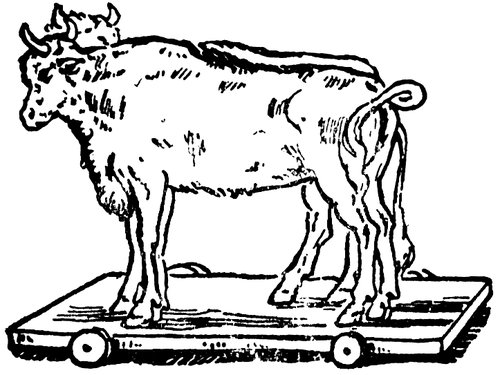
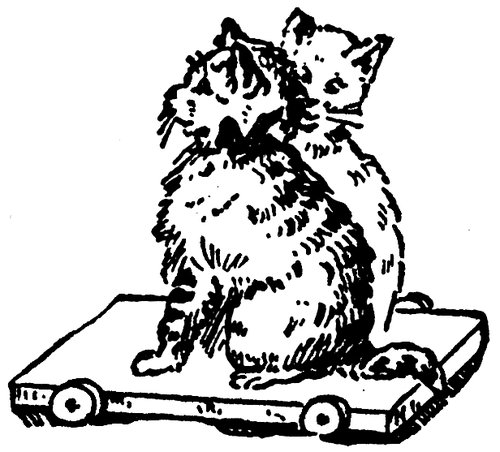
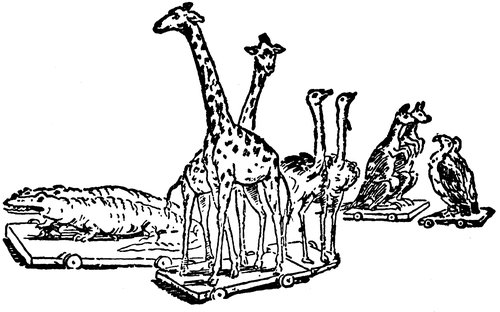
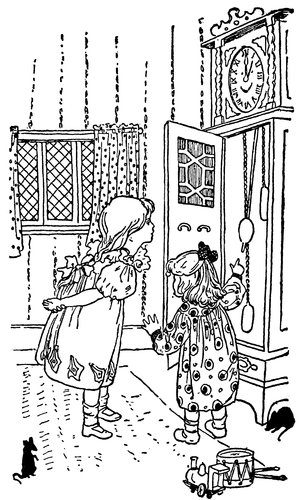

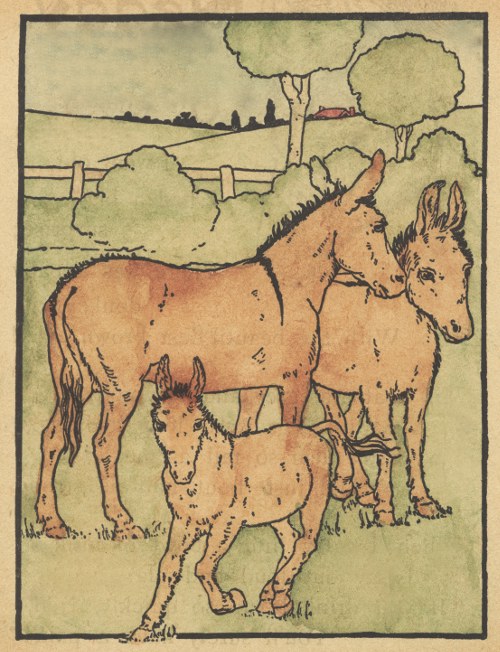
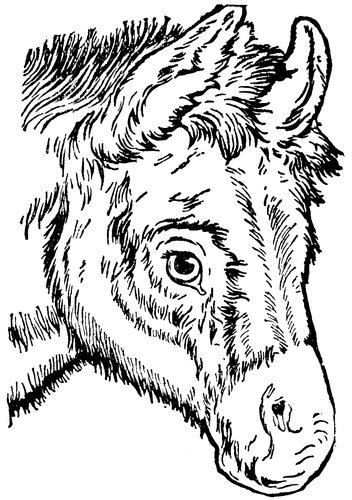
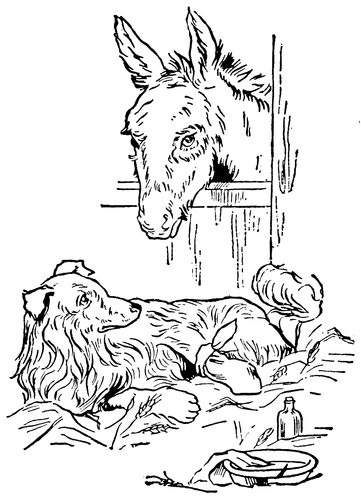
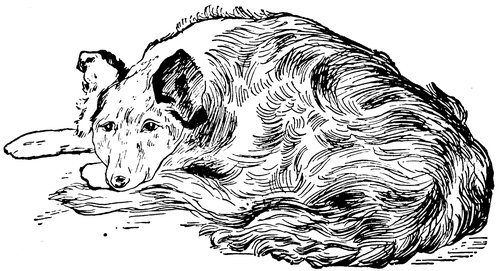
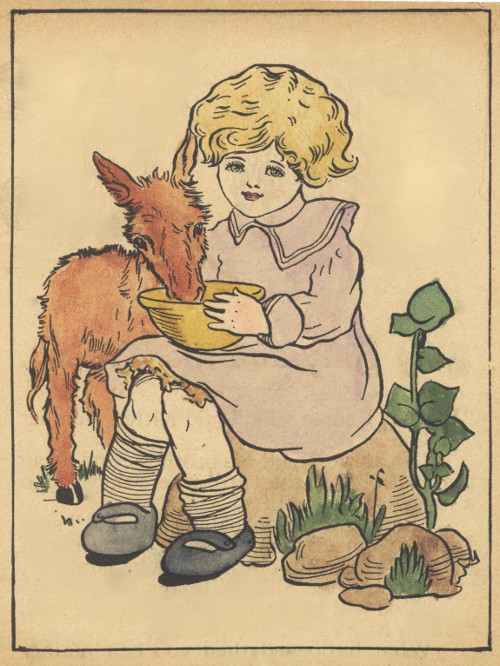
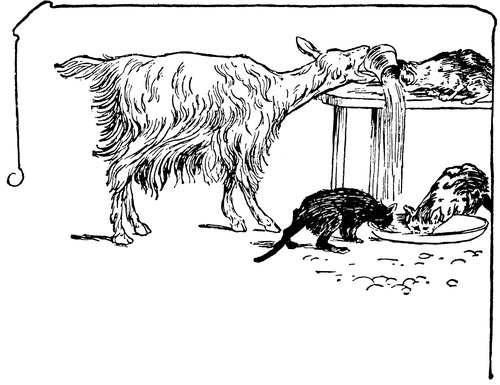
“I want some milk,” said Kitten Number One.
“So do we,” said his brothers, and away they pattered to the yard, where they found a lovely saucer full.
“Saucers are too babyish for me,” said Kitten Number One, “I shall drink out of the jug.” And up on the table he jumped.
Along came Silly Billy, the kid.
“You will never do it like that,” he said. “Bite a hole in the jug, like this.”
What happened then, you can plainly see by the picture, and it is the kind of thing that does happen when Silly Billy comes along.
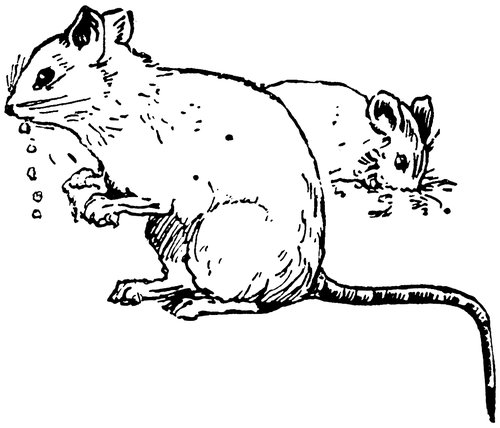
When the Kittens and Silly Billy were safely out of the way, Mr. and Mrs. Whiskers popped out of their front door.
“Milk, milk, I sniff milk,” squeaked Mrs. Whiskers, and she began to drink up every drop she could find, while poor Mr. Whiskers sat and cried because he could not find any.
But he soon dried his tears when they got to the scrap heap, where they ate till they were like little round barrels.
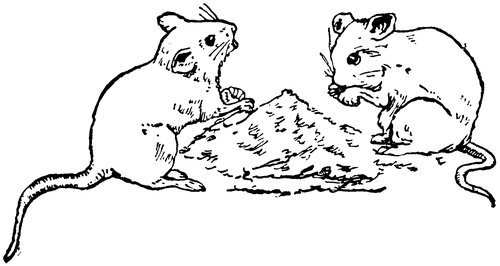
Meanwhile, Silly Billy had told the kittens of a lovely plate of food, outside the kennel where Jack lived.
And the foolish kittens hurried to it, and began to eat as fast as they could.
Out of his kennel came Jack, with a mighty shout, which sent the kittens rolling over with fright. They never tried to eat Jack's dinner again, and it was a long time before they quite forgave Silly Billy for being so silly.
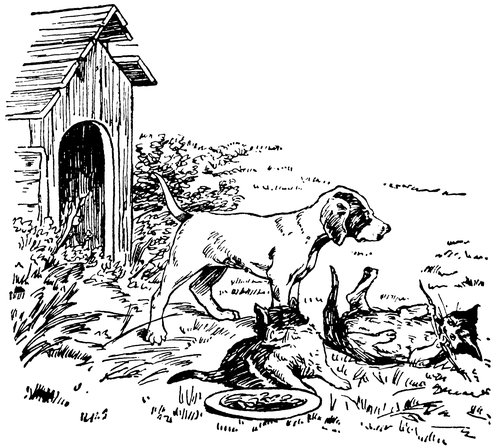
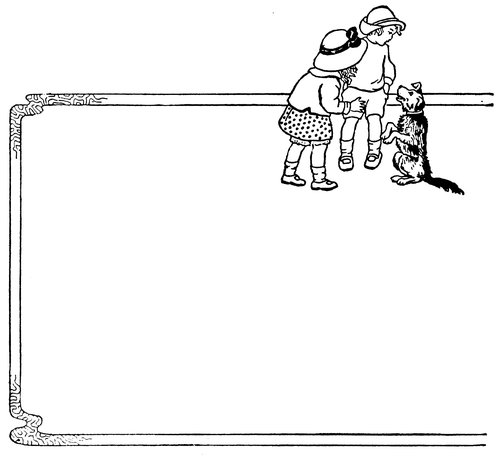
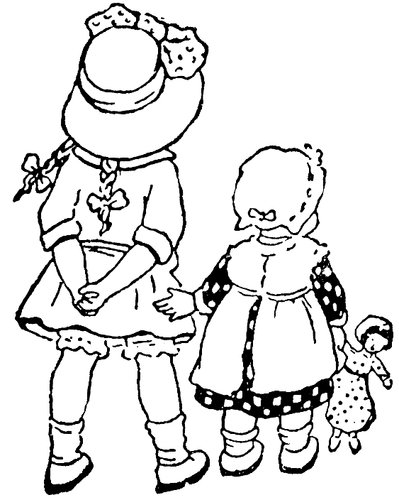
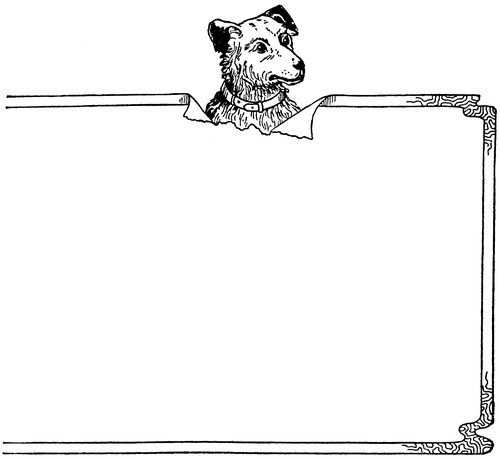
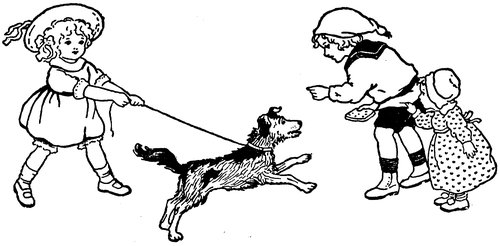
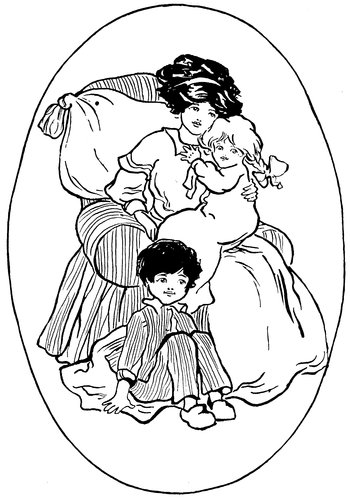
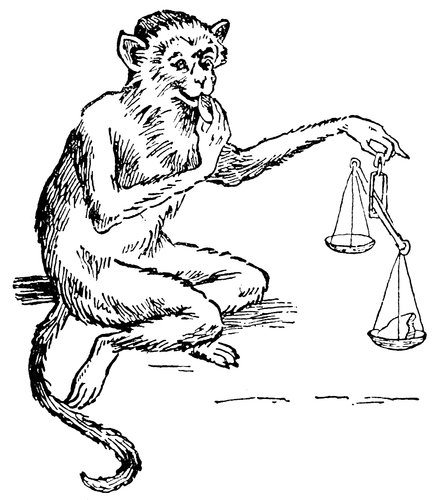
Two cats took some stolen cheese to a monkey to divide for them, as they could not agree about it. The monkey put a piece of cheese into each side of the scales. One piece weighed down the other, and from this the monkey took a large bite; this made the other side heavier, so he bit a great piece off that.
The cats tried to stop him, but he only laughed and went on biting first one piece and then the other, until both had disappeared, and the cats were left with nothing at all.
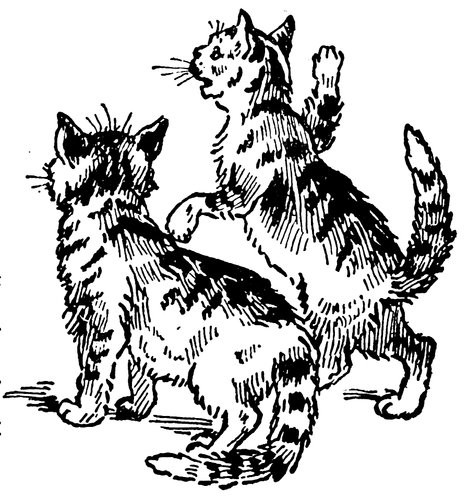
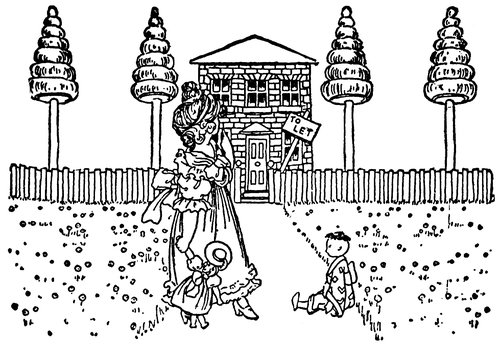
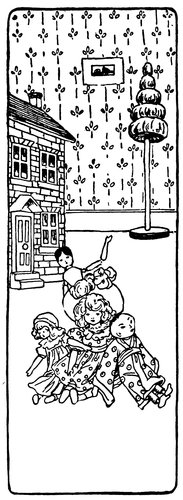
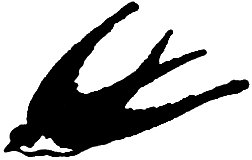
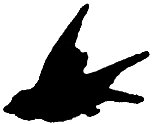
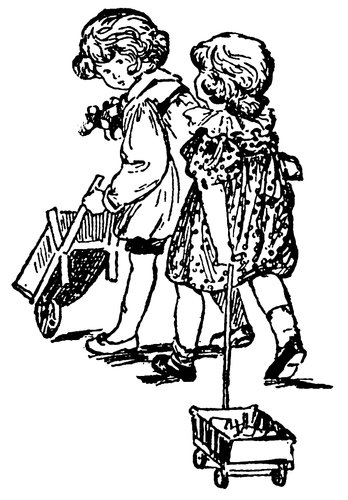
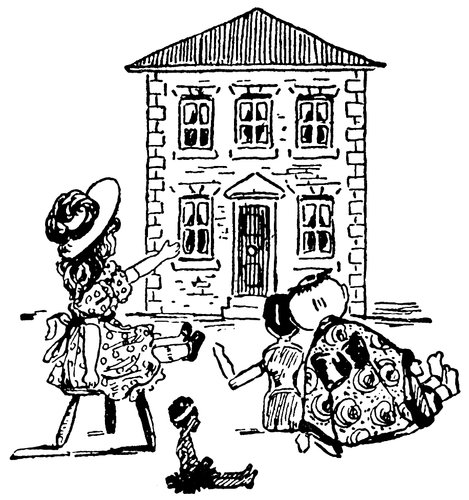
A young fox who went to steal chickens in a farmyard, got his beautiful bushy tail caught in a trap.
Finding it impossible to get away, he bit off his tail and ran home, feeling very much ashamed of his appearance when the other foxes laughed.
“Tails are quite out of fashion,” he said, as they went on laughing.
“They are no use, and dangerous, too. You can run faster without them. Why not cut them off as I have done?”
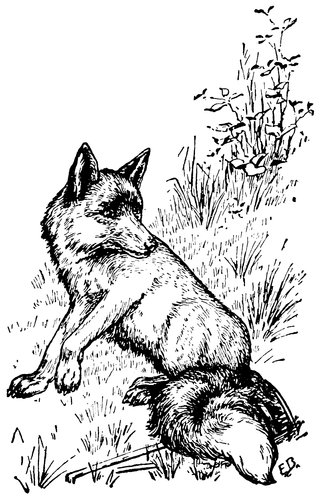
Some of the smart young foxes were eager to be in the fashion; but a wise old one slyly said, “We will wait till we are caught in traps before we bite off our tails.”
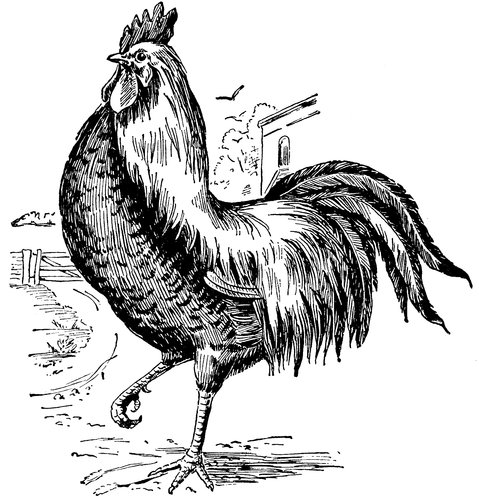
The Early Bird that Catches the Worm

Mrs. Gamp and Mrs. Puss-Cat lived all by themselves in a wee wee house. Mrs. Gamp was a dear old soul with snowy white hair, and rosy red cheeks, and such a smiling face and kind soft heart.
Mrs. Puss-Cat had a lovely tabby coat, as smooth as velvet, and a beautiful fluffy tail. Her eyes were bright and twinkly, and she would sit in front of the fire for hours and hours thinking of nothing but mischief.
One day Mrs. Gamp was invited out to tea. She put on her very best gown, and her new mob-cap trimmed with ribbons and flowers.
When she looked at herself in the glass she felt pleased!
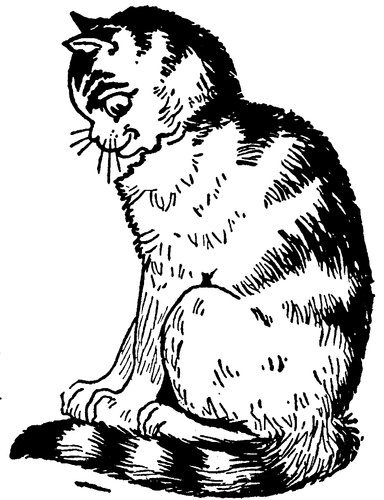
As soon as Mrs. Gamp had gone, Mrs. Puss-Cat gave three loud purrs of joy, and all the mischief she had been thinking came out at once.
She trotted into the garden and got her feet all covered with mud.
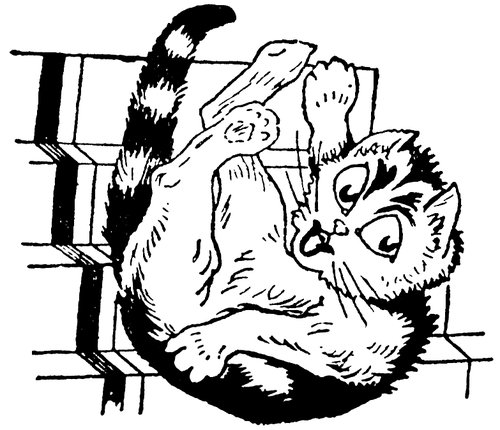
Then she scampered upstairs, and danced a cat dance all over the clean white counterpane on Mrs. Gamp's bed. She climbed on the washstand, and upset the water jug, then she squeezed into the wardrobe, and pulled Mrs. Gamp's dresses out on to the floor. And some of them she tore to teeny tiny shreds!
When she had finished she darted out of the room.
But alack-a-day! At the top of the stairs she slipped, and fell—bumpetty, bumpetty, bump, all the way to the bottom.
Presently Mrs. Gamp came home. And the first thing she heard was a strange noise in the kitchen. First a miaou. Then a sob. Then more miaous. Then—sob, sob, sob! She opened the door, and there, perched upon a stool in front of the dresser sat Mrs. Puss-Cat.
Her head was swollen very, very big. Round her neck was tied some of the ribbon off Mrs. Gamp's best bonnet, and another piece was twisted round one fat paw. And from her big round eyes great tear-drops were falling—splash, splash upon the floor.
Mrs. Gamp threw up her arms. “Oh! dearie me!” she cried. “What ever is the matter? Oh! dearie, dearie me!”
“Miaou, miaou!” sobbed Mrs. Puss-Cat. “Oh! my poor paw! My poor, poor paw!”
Mrs. Gamp's tender heart was touched. She rushed upstairs to fetch some ointment. But when she opened her bedroom door—well! you know what she saw!
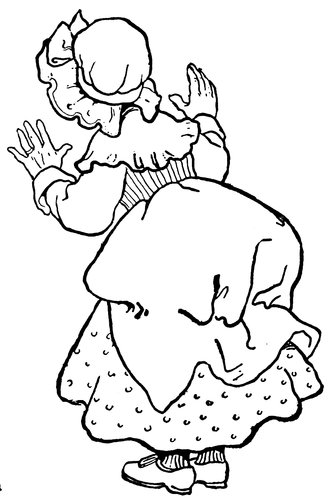
Her tender heart grew cold as stone, and oh! she was so angry! She raced downstairs, and gave Mrs. Puss-Cat the biggest whipping she had ever given her before.
Then she took off her best ribbon, and opened the front door wide.
And Mrs. Puss-Cat went slinking out with her tail between her legs, and a terribly vicious look in her big round eyes.
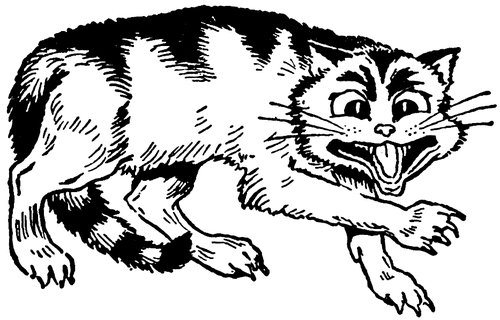
But Mrs. Gamp's heart soon grew tender again.
She opened the front door, and called Mrs. Puss-Cat back. And Mrs. Puss-Cat came at once, looking very penitent and sad.
Mrs. Gamp gave her some nice hot milk, and put her in a comfy basket in front of the fire.
Then she sat by her side, and stroked her smooth velvety head.
And slowly all the naughty mischief slipped out of Mrs. Puss-Cat's head, and nice, kind thoughts came in.
And now she is really and truly the nicest Mrs. Puss-Cat in the world.
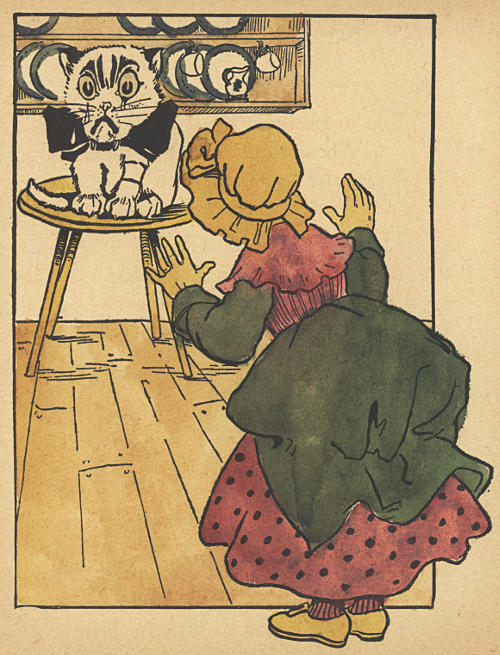
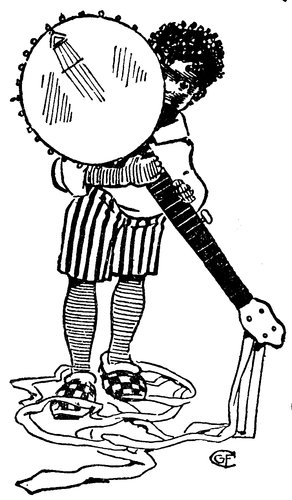
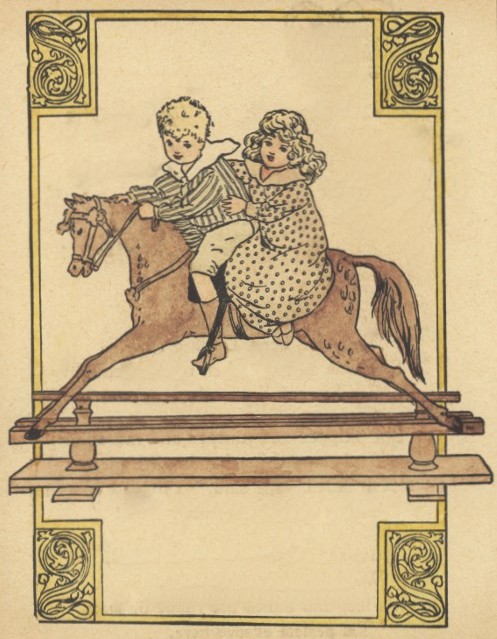
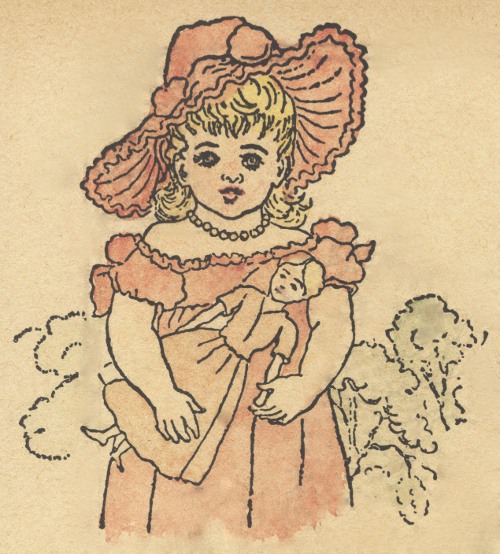
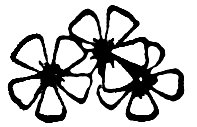
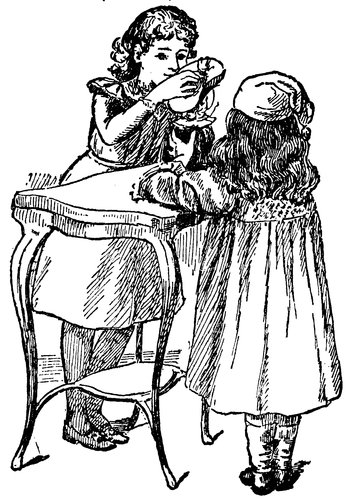
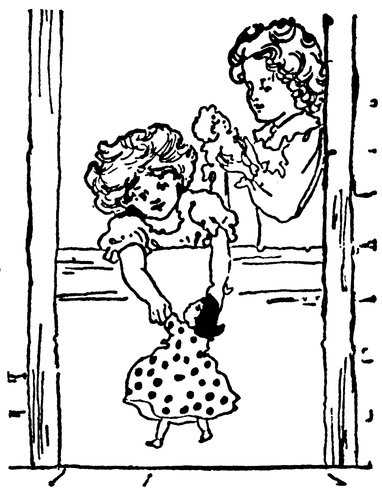
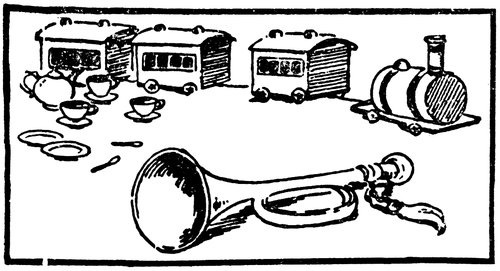
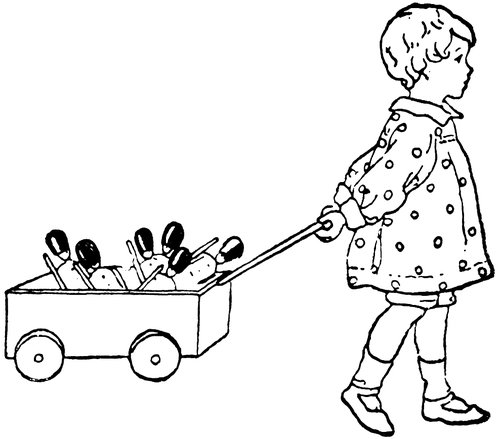
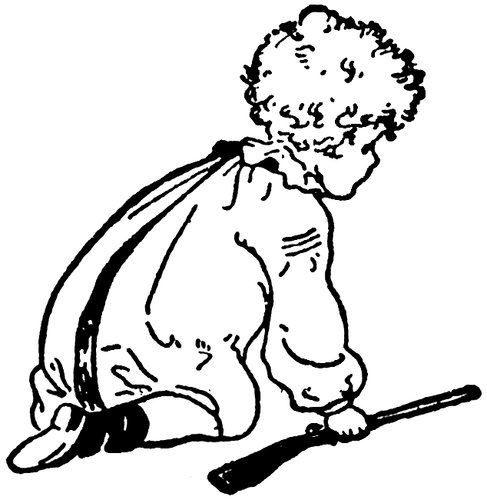
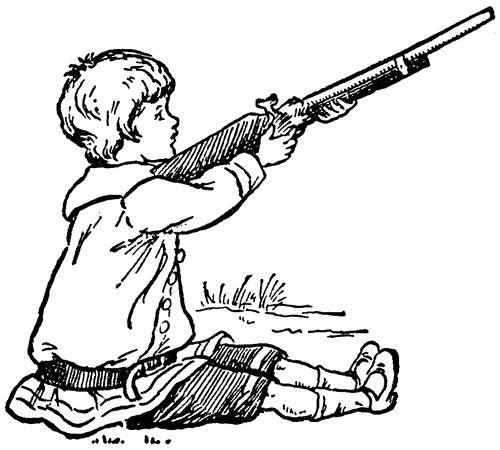
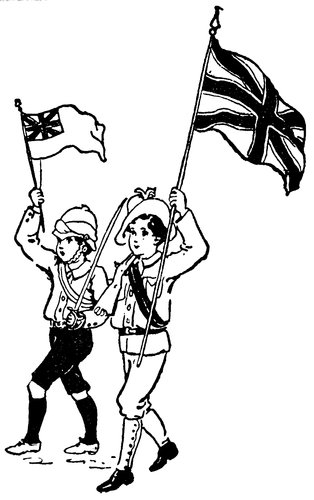
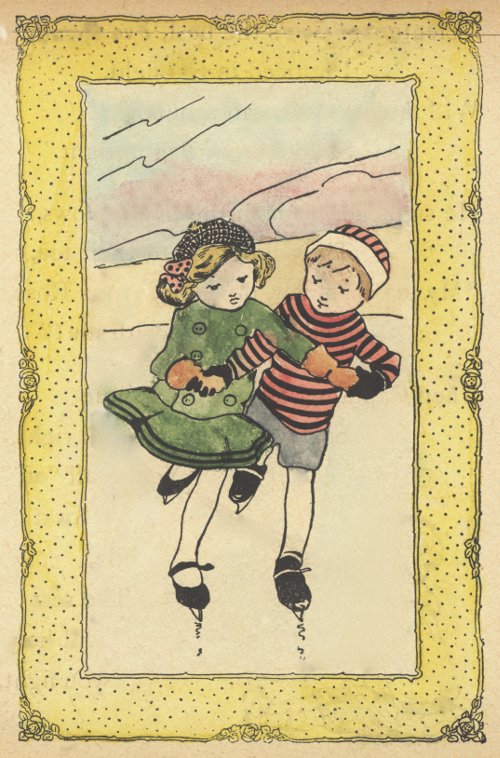
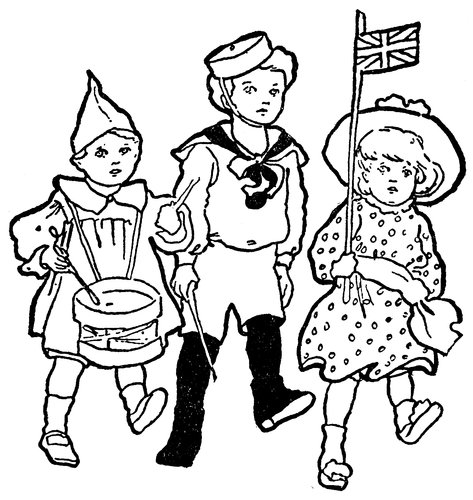
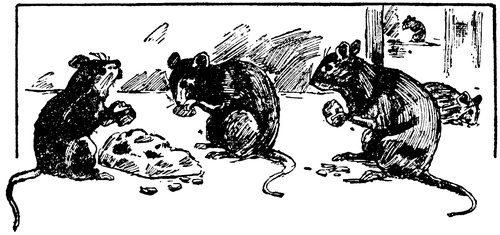
One day two little mice entered an old house where they hoped to settle down and make their home, Mr. and Mrs. Mousey by name.
After looking about for some time they decided on a corner close to the kitchen wainscot, and not far from the larder.
They made a cosy little nest of string and paper, working hard all day, hardly resting till late at night. As to food, Mr. Mousey soon found where that was to be got. Many were the visits he paid to the larder, and delicious were the biscuits and cheese that he found there. It almost seemed as if things were left for them, for the biscuits were in bags and the cheese uncovered.
At last the nest was finished and they lay down to rest.
The very next morning six very tiny pinkish-looking things were to be seen in the nest. They had bright eyes and long tails, and would soon grow into brown little animals like their father and mother. Oh, how proud the latter were! Mr. Mousey could hardly keep his eyes off them, and Mrs. Mousey danced round squeaking with delight. “They are beautiful, my dear,” said Mr. Mousey, “just like you.”
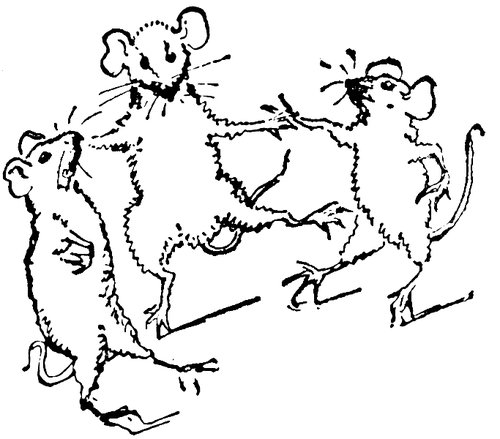
“Pardon me, my love,” said his wife, with a proud look at their darlings, “they are likely to be as handsome as you.” The parents embraced each other tenderly, and then Mr. Mousey started off to find food for the little family.
Every day the children grew bigger and stronger, and merry games they had, as they chased each other round the nest.
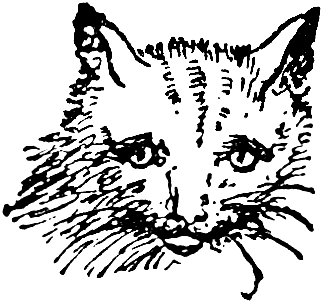
But, alas! their happiness was not to continue. One sad day a terrible disappointment awaited Mr. Mousey. He had started off on his usual visit to the larder. He returned almost at once, saying,
“My dear, we must move. I heard the Cook say everything was to be put in tins, so we shall starve if we stay, and,” with a shudder, “worse still, she has got a cat. I fear she will hear the children's voices, and we shall be caught.”
So gathering their family around them they told the sad news, and glancing tearfully at their cosy nest, they crept sadly away.
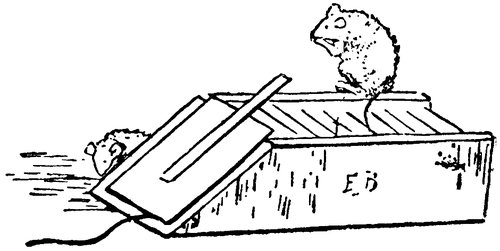
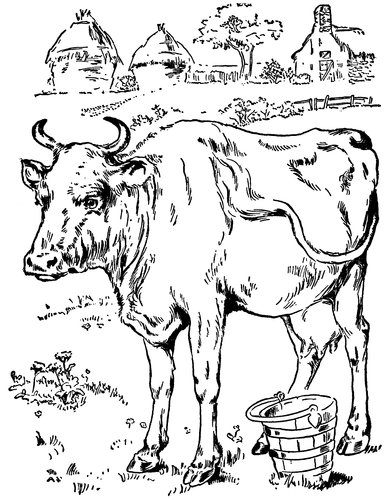
MILKING TIME.
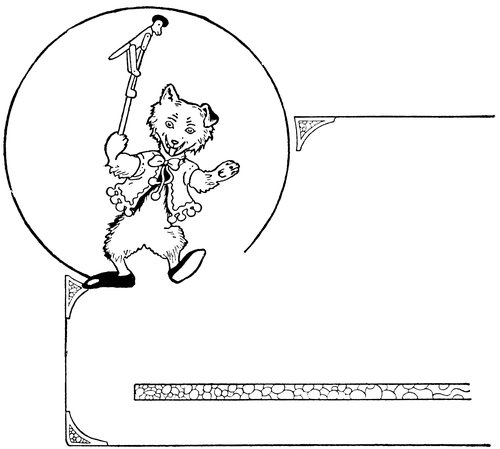
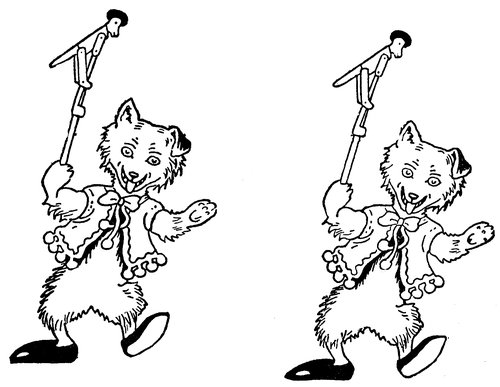
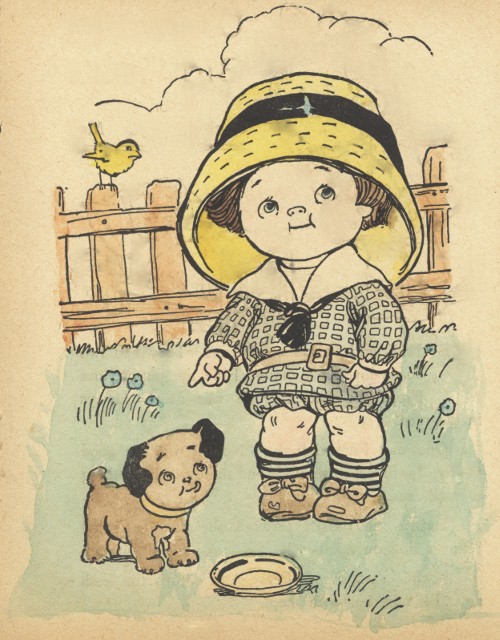
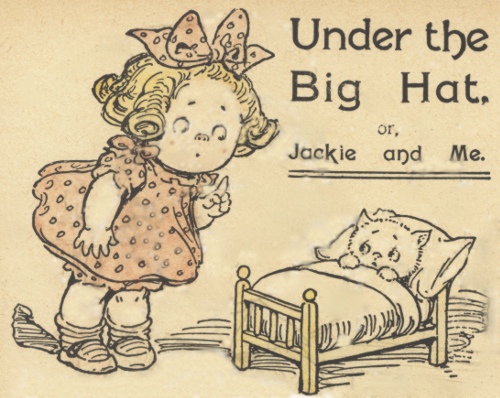
Jennie and Jackie were twins. They had two dearly-loved playmates, Fifie the puppy, and Fipps the kitten. Fifie was nearly always in disgrace.
One day Fifie thought, “Now I will be good to-day. I will sit in the field and there will be nothing to make me naughty.”
But as he passed through the hall he spied Jennie's doll on a chair.
“Ah!” said Fifie, “Betsy Ann enjoys the fresh air. I'll take her with me.”
So he carried her off and carefully laid her on the grass.
After a while he grew fidgetty and then he saw that Betsy Ann was staring at him with her great eyes.
“Don't stare at me like that!” he barked.
But she took no notice and went on staring. This made him so angry that he bit her foot, and when it came off in his mouth he tore her arm, and then rolled her over and shook and worried her, until she was lying scattered all round him in lots of pieces.
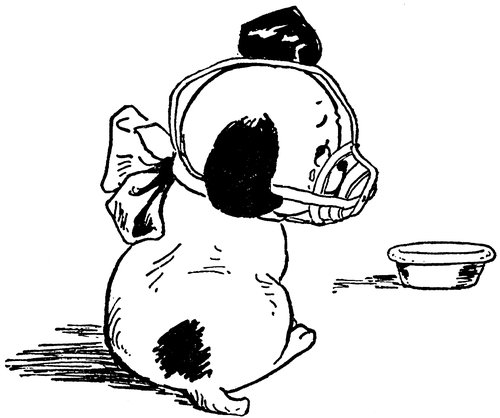
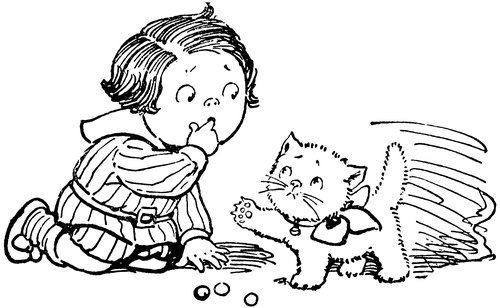
When Jennie ran up with her ball, he was just gnawing off Betsy Ann's left hand.
Jennie was terribly upset about it, and when Nurse came, Fifie was soundly smacked.
Not long after there were fearful mi-ows from the pond. Jennie rushed with her butterfly net, and was just in time to save Fipps from drowning.
He had been trying to catch fish in the pond and had fallen in.
So Jennie carried him home and put him in Betsy Ann's bed.
Jackie used sometimes to dab a little butter on the tip of Fifie's nose just for the fun of seeing him try to lick it off with his tongue and roll his eyes round and round to try and see it.
When Mother heard of Fifie's naughtiness with Betsy Ann, she said that Fifie must wear a muzzle for some hours every day until he learnt to behave better. Poor Fifie! how he hated it and longed to join in the romps with Jennie and Fipps.
However he was so good for a week, that Mother said the muzzle might be left off.
And here you see Jennie with Fifie and Fipps, celebrating the happy occasion with fairy cakes which cook had given them.
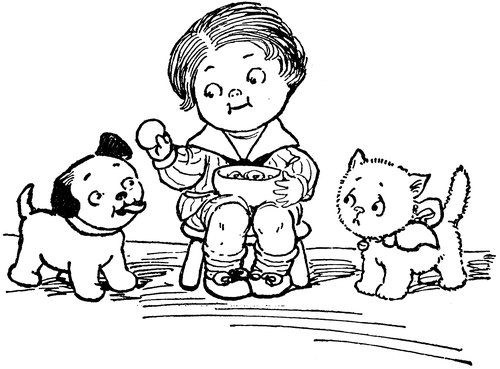
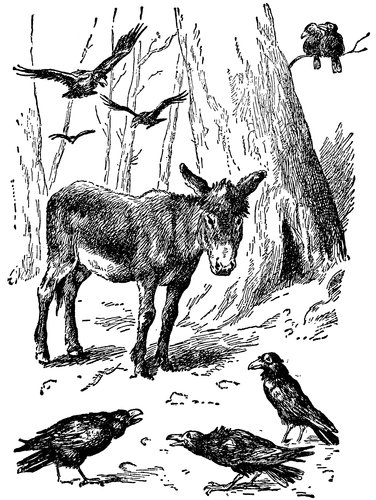
Out in the Cold.
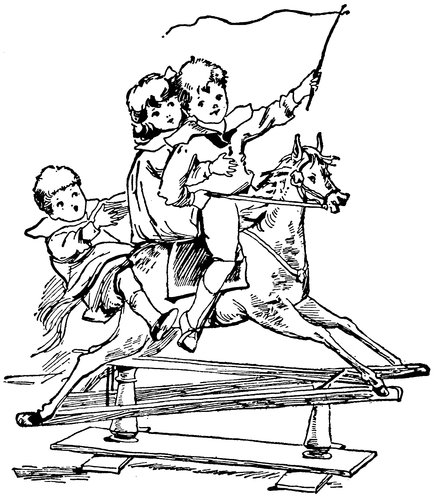
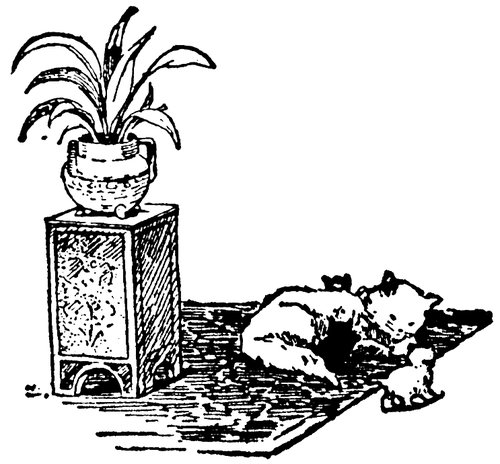
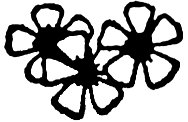
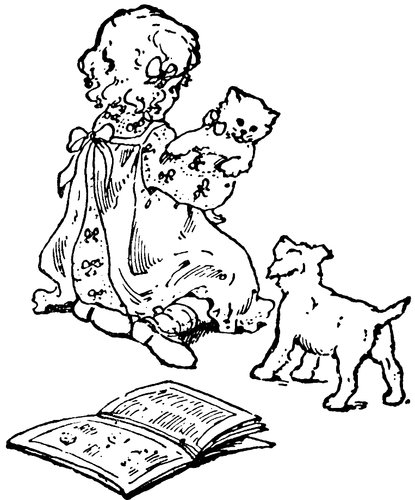
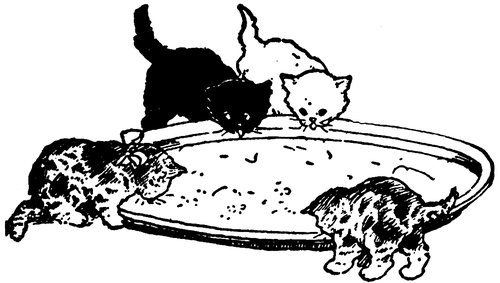
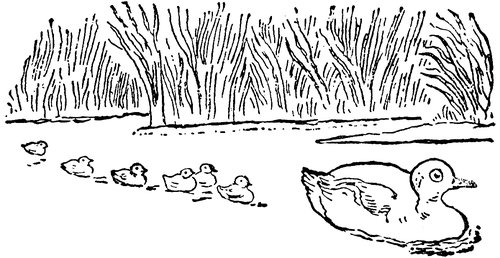
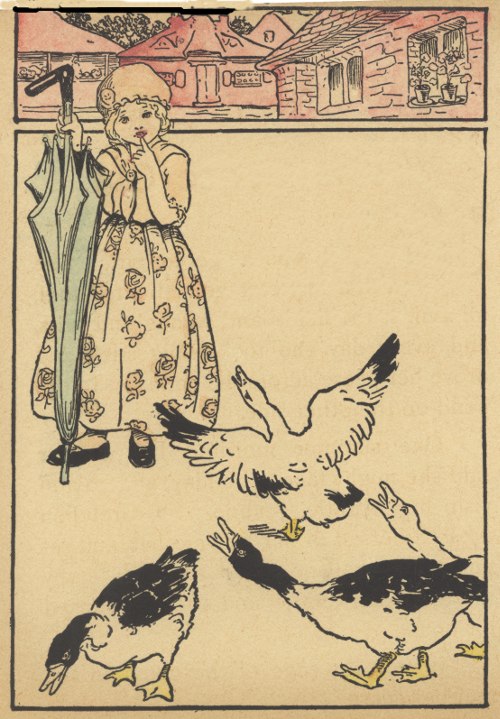
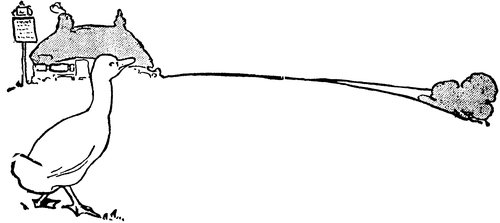
Gretchen was a goose girl. She lived in a tiny cottage with a red roof, all amidst the fields, and woods, and hills, and every day she took a big stick and drove her geese across the common to the pond on the other side.
One summer morning her mother said she might take a holiday, and go and visit her Auntie Jeanne. So Gretchen dressed herself in her best clothes, and set out to the village. She spent a happy time with her auntie, and after tea started for home.
Just on the edge of the common she met her geese.
When they saw her they began to cackle in great excitement, and caught hold of her skirts. Gretchen drove them off with her umbrella. But they only waddled on a little way, then looked back to see what she was doing.
“I believe they want me to follow them!” cried Gretchen.
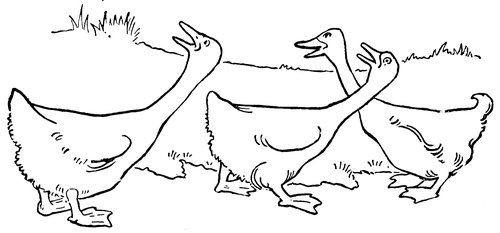
As soon as the geese saw her coming they began to run, and Gretchen ran after. On and on they went, over the common, across the fields, until they came to a little shady dell in a wood. And here Gretchen stopped, and clapped her hands with delight, for on the mossy ground was spread the most delicious tea she had ever seen. All around sat a number of little brown rabbits. Peter Bunny spied Gretchen first.
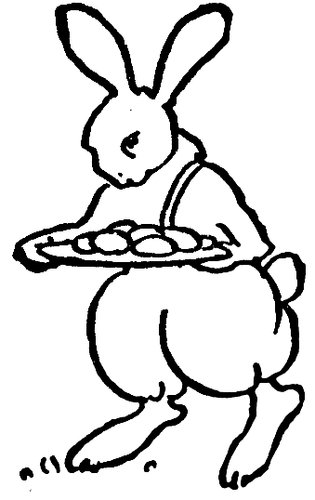
“Look, mother!” he cried. “There's a little servant girl!”
“So there is!” exclaimed Mrs. Bunny, staring at Gretchen. “What wages do you ask, my dear?”
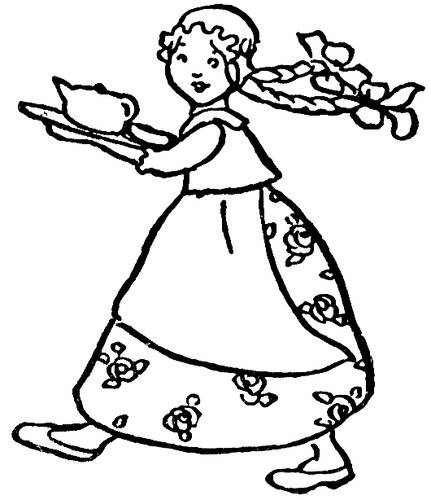
Gretchen thought this great fun. “If you please,” she said, “I should be quite satisfied with some of those lovely cakes.”
“As many as you like,” said Mrs. Bunny. “Now go and fetch the tea.”
The geese had vanished, so Gretchen filled the tea pot from the little kettle on the fire, and Peter Bunny carried dishes of cakes. Then they all sat down, and Gretchen had as many cakes as she could eat. When tea was over, Mrs. Bunny told Gretchen to go and play with the children until bedtime.
“What's that?” asked Peter, presently, pointing to the umbrella, and Gretchen showed him how it opened and shut.
“I know!” he cried. “We'll go for a sail in the air.”
“Hurrah!” cried all the other rabbits, and they dragged Gretchen and the umbrella on to the common.
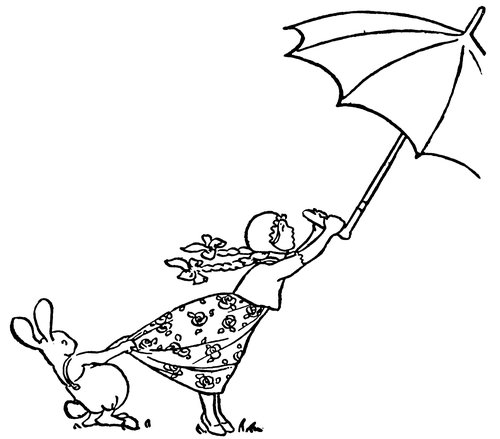
She opened the umbrella wide, Peter caught hold of her skirts, and the other rabbits joined on behind, holding on to each other's tails. “One, two, three—go!” cried Peter, and the whole party went soaring into the air. It was a delicious feeling. Higher and higher they went, until at last they were right above the clouds.
“Oh!” cried Gretchen, suddenly, “the umbrella's shutting up! Oh! whatever shall we do?” Sure enough the umbrella was no longer puffed out like a balloon, but hanging loosely round the handle, and the next moment it began to fall.
“We're tumbling into the sea!” cried the rabbit at the bottom of the chain, and there was a loud splash.
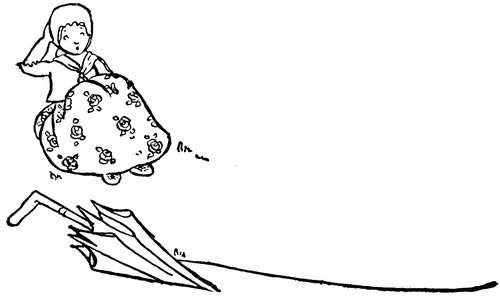
Splash, splash, splash! One by one all the bunnies fell in until only Peter and Gretchen were left. All of a sudden the umbrella flew out of her hands, and she awoke to find herself sitting by the side of the pond, while her geese were splashing in for their evening swim. On the ground in front of her lay the umbrella, but Peter and the rest of the rabbits had completely disappeared.
“I hope they're not drowned,” she said, as she got up and peered into the pond. But the water was so clear she could look right to the bottom, and no sign of a bunny rabbit could she see.
“It must have been a dream,” she said, as she smoothed out her dress. “But those cakes were lovely. So was the journey through the air.” She picked up her umbrella and opened it, but it wouldn't lift her an inch off the ground. So she scampered home to find mother standing in the doorway looking for her, but when she told her story, mother laughed.
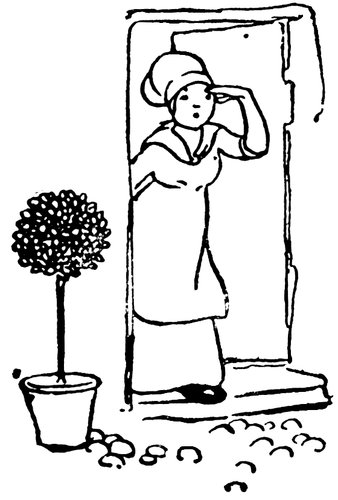
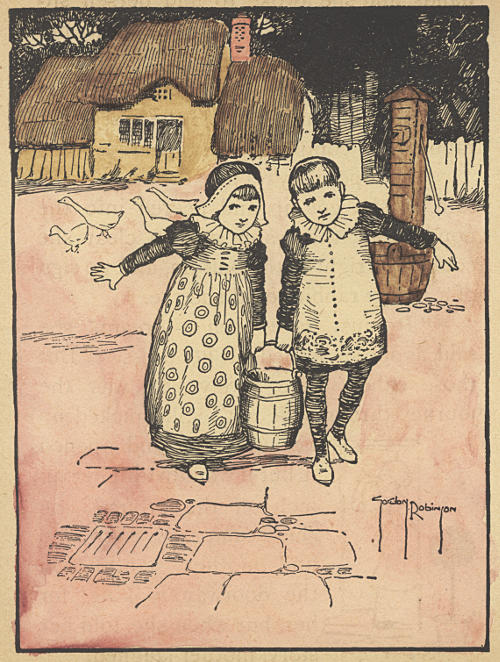
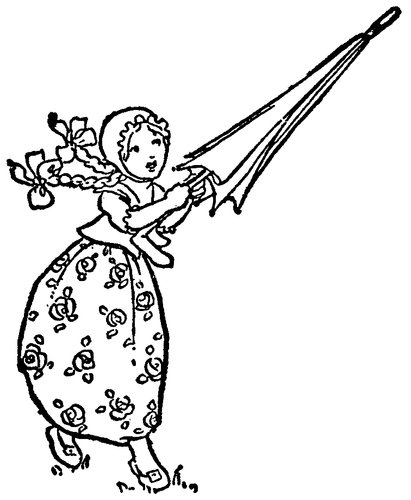

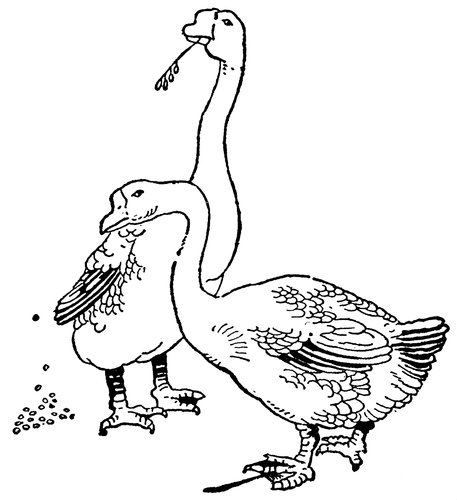
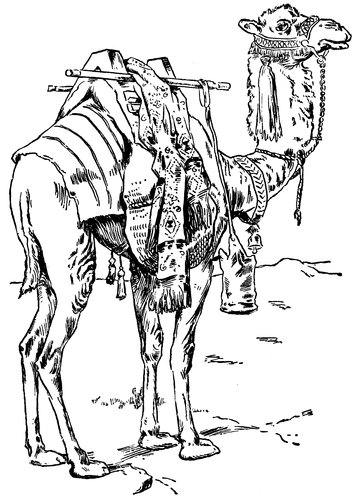
A Camel
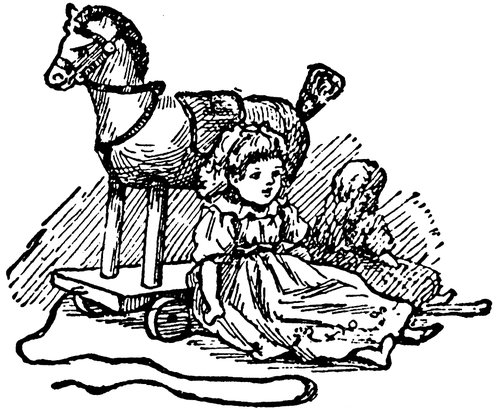
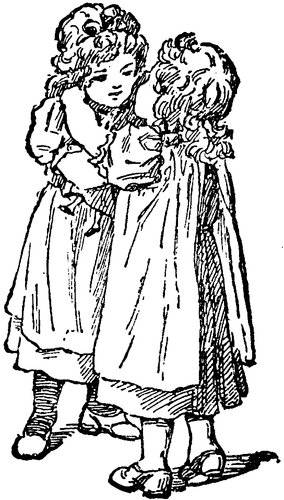
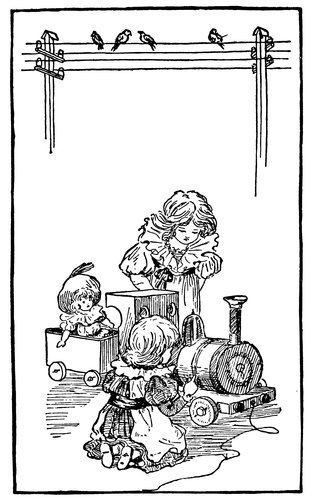
The Nursery Express.
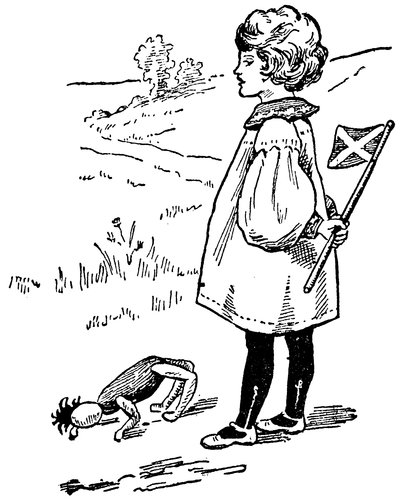
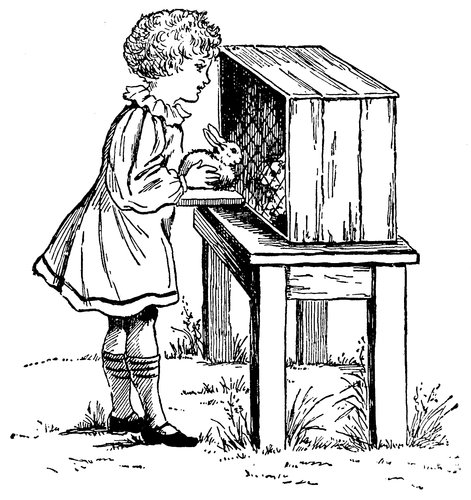
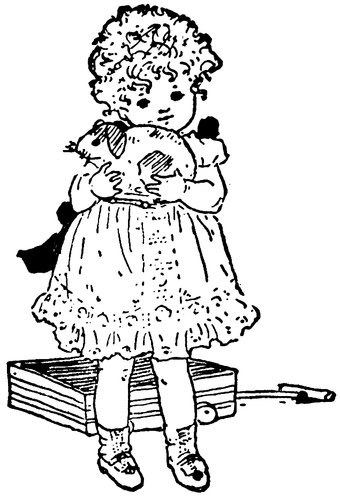
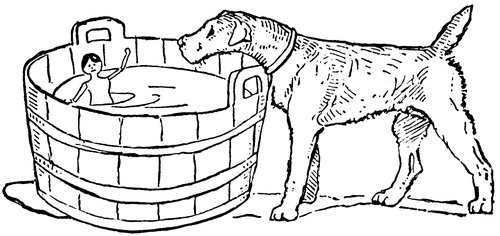
My name is Tim, and I am only a rough-haired terrier dog, so you must not mind if I make mistakes in this story, because it is the first time I have ever told a real, story book one.
I thought perhaps you would like to hear about some of the people I met the first time I went on a visit with my master.
We went to stay at a big house in the country. There were no other houses round it, only lots and lots of trees, and they kept the houses away, I expect.
When we first arrived, I kept pretty quiet The train had made me feel rather queer in my legs. I wasn't frightened; none of our family are ever frightened of anything—certainly not of a silly old train that doesn't even know how to growl properly.
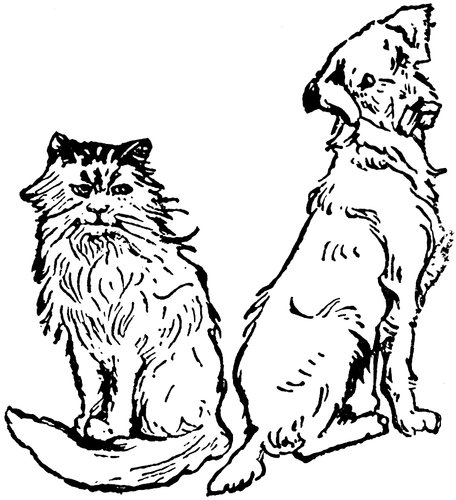
Well, after I began to get used to things, I went out into the garden to see if I could find someone to play with. It was rather dull without Jo. He is my brother, but he isn't old enough to go visiting like I do.
At first there did not seem to be anyone about at all. Then I saw an old wooden tub.
I went and had a look at that. I have found some funny things in tubs before now—sticks and boats, bits of cork that give you a pain inside if you eat them—but never have I seen such a funny thing as there was in this tub.
It was very small, with shiny black hair, a shiny red face, and it was swimming about just like a fish. It smiled at me all the time, too. I didn't like that a bit, so I barked as loud as I could; but it made no difference. I could not make it out, and I got very angry, so I walked off with my tail in the air.
In a sunny corner I found the Duke and Duchess. They were very rude to me indeed. In fact, the Duchess spat at me, just like the common Tabby family do at home.
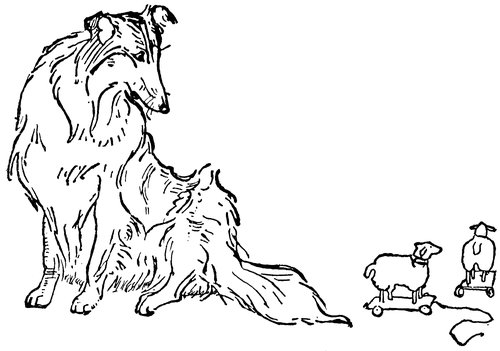
I very soon left them, and then I found Laddie, the fine old Scotch collie, but he wasn't much fun; he is nearly deaf, and he was very busy staring at some white woolly lambs on green stands. Laddie loves those lambs; he once ate one when he was young. He told me so himself, and—it was much worse than eating cork.
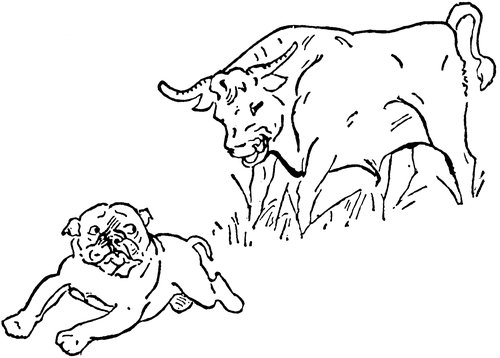
Then I heard a great deal of barking, growling and snarling.
I knew it must be Bob, the bull dog. I had been longing to fight him ever since I came. I ran to the field as fast as I could, my heart beating very hard, for Bob had boasted to me of all the fights he had won, and I was thirsting to beat him.
Then I saw him, tearing down the field, his tail tucked in between his legs, his ears laid flat. He was running away from the old red bull. He had made faces at him, and then ran away when the bull pretended to chase him. I wasn't going to fight him after that. I wouldn't run away from an old bull.
Bob ran into the kitchen, and pretended to be asleep when I spoke to him.
I went back to the tub after that, and I just went straight up to the funny, smiling thing, and—I kissed it. After that, we were great friends, and had lovely games every day till I went away. I wonder if Bob ever plays with it. I will fight him if he does.
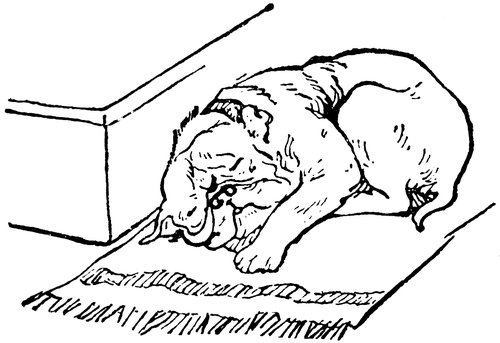






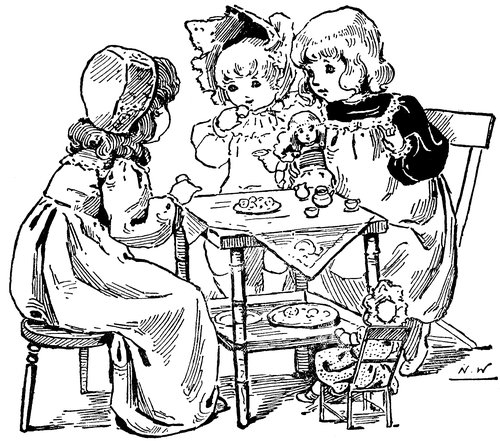
A lean, hungry wolf was prowling about in search of supper, when he met a big well-fed mastiff. “How do you manage to look so sleek, when I, who work ten times as hard, am half-starved?” inquired the wolf.
“Oh,” said the dog, “I watch the house at night and sleep all day.”
“Just the thing for me,” said the wolf, “but first tell me, what is that mark round your neck.”
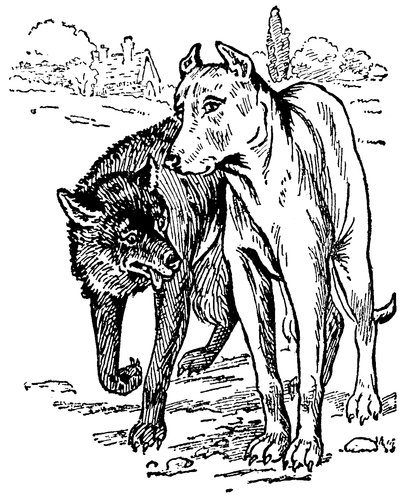
“That's only made by my collar,” answered the dog. “I am chained up all day. They say I may bite, but that is all nonsense.”
“Good-bye,” said the wolf, turning back. “Chained up, indeed! No, thank you.”
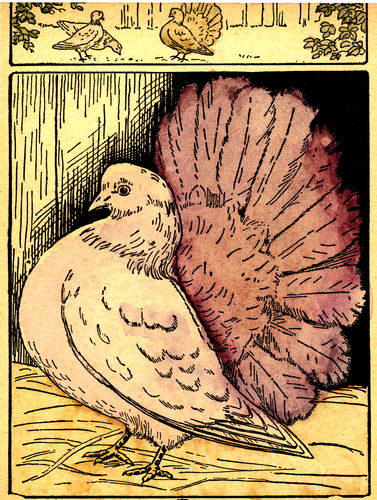
A Pigeon.
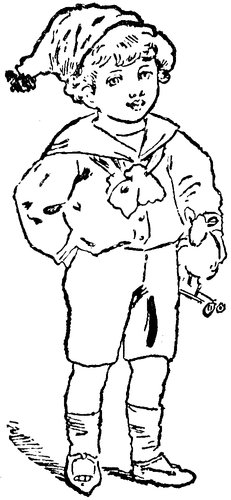
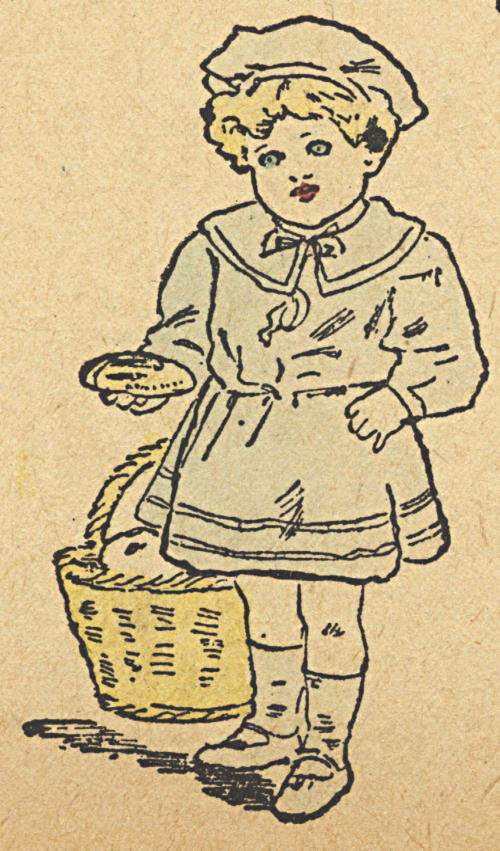
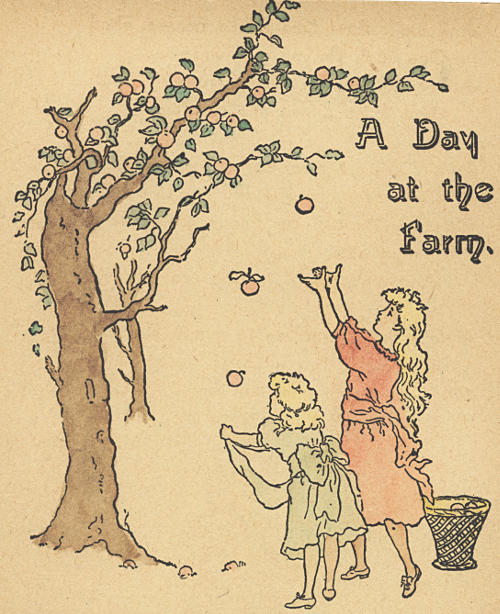
It was Margery's and Trixy's birthday; they were exactly the same age, so they had only one birthday between them, but they had always gone shares in everything as long as they could remember, so they were quite happy in sharing their birthday. And what a splendid birthday this one had been! First of all, they had been allowed to choose their birthday treat, which was to go to Woodcote Farm.
They had driven to the farm in the morning, sitting on the box-seat of the waggonette by John, and as soon as they arrived they had gone all round the farmyard, and looked at the dear little ducks and chickens, and every other living creature on the place. They had well shaken the apple tree and filled their pockets with lovely rosy apples. After dinner they had gone out into the big field to have a game with old Dobbin. Dobbin seemed to understand that the children wished to catch him by his long tail, and would stand still until they nearly touched him, and then with a toss of his head would gallop off to the other side of the field, followed by the children, until at last, quite out of breath, they had flung themselves down under the willow by the side of the little stream.
The afternoon was warm, and Trixy was surely getting a little sleepy, when Margery suddenly jumped up. “Come, Trix,” she said, “I hear the waggonette;” and off they ran as fast as they could.
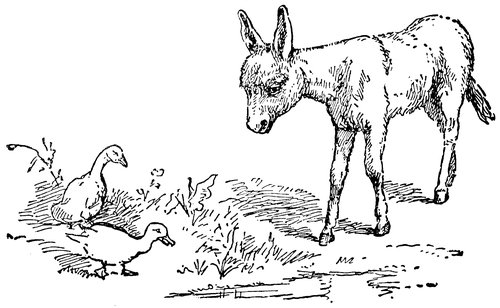
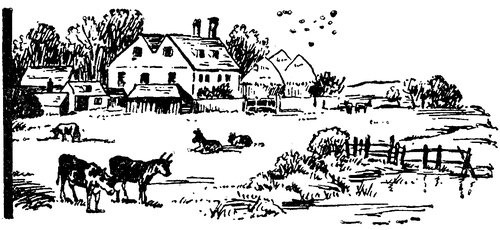
The Farmyard.
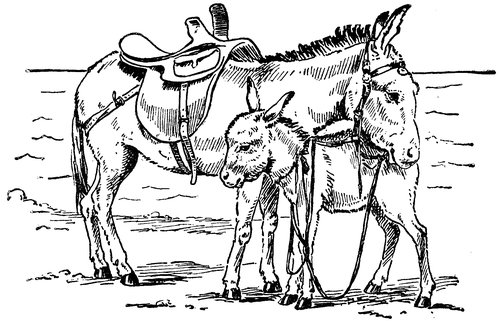
Waiting to be Hired.
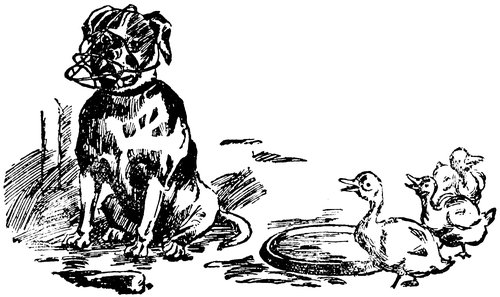
“We are off to the Front!” cried the three children when they were ready for their walk.
“Have you got all you want for the Front?” asked their mother, laughing.
“Yes, everything,” said May. “Tom has a drum and Bertie a bugle, and I am the rest of the army.”
“Very well. Don't be too long at the War, because tea will soon be ready. Better go to meet your father.”
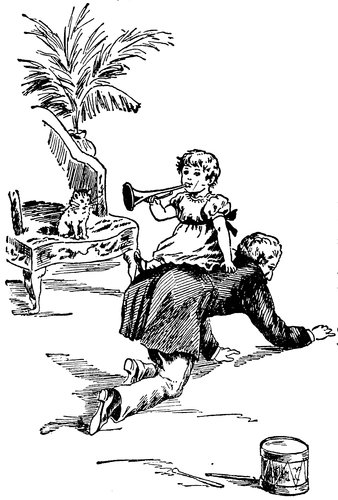
“So we will!”
And away went the three over the white snow in the bright winter day; Tom beating the drum till it was a wonder the parchment did not burst, and Bertie blowing the bugle till he had hardly any breath left. What a splendid noise they all made together! Birds flew out of the hedges and rabbits scuttled away as the army marched on, feeling very warlike indeed; and presently met the army's father.
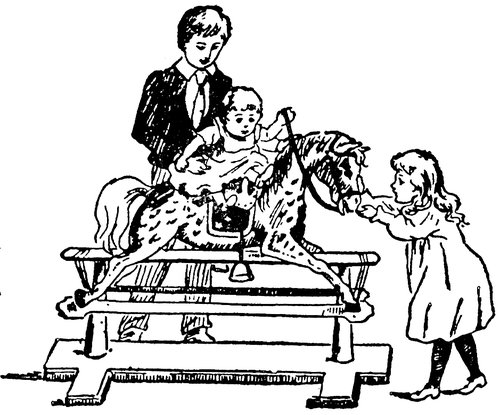
“Please be our General, father,” they begged, “and lead us against the enemy.”
“Certainly,” he replied; “but first we will return to camp and storm the tea-table.”
So home they went in the same fashion, with drum beating and bugle blowing.
After tea, the younger children also volunteered for the Front, and Uncle Bob was little Dick's horse, for of course cavalry was needed. How Uncle Bob pranced and galloped! The trumpeter nearly fell off his back, but went on blowing the trumpet all the same. Uncle Bob told him to blow it well away from the horse's ears, so Dick sat backwards. As for Baby, big brother Gerald put him on the rocking-horse, to be a rough-rider.
“The great thing is to learn to stick on,” said Gerald, “because you will find falling off is very easy. Hold the horse's nose, Nellie; it seems rather a wild one.”
At last everybody joined the army, except the cat. She sat on a chair and turned up her whiskers; for cats like peace and quietness, and there cannot be much of either when soldiers go to the Front.
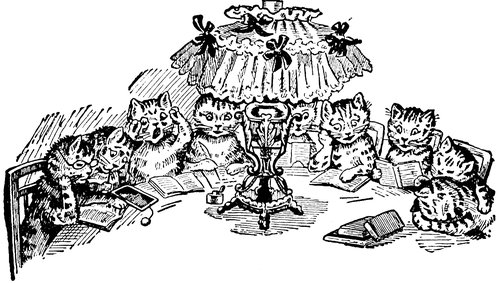
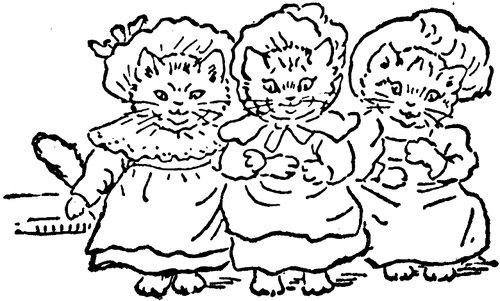
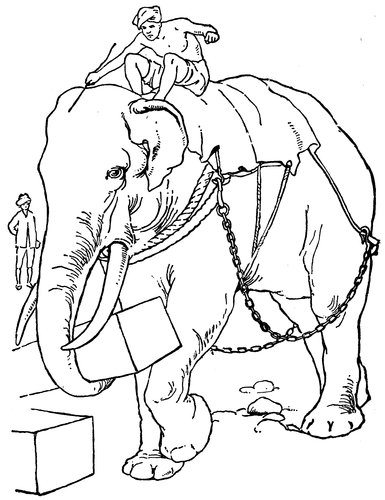
An Elephant at work.
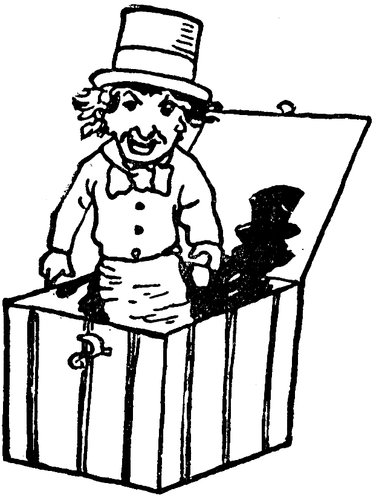
“Hullo, hullo, here I am again!” cried Mister Jack-in-the-box, as he sprang up in a great hurry one day.
Then he looked all round him. He was wondering what could have happened to all his friends.
“This is very funny,” he said to himself. “I wonder where they can all be; they can't have gone to a party and left me behind. Besides, they have not had time to put on their best clothes, for I have only been having forty winks.”
That was what he thought, but he had really been asleep for a long time, and a great many things had happened which he knew nothing about.
Presently, Dobbin, the big wooden horse, came walking slowly by.
“Hullo,” cried Mister Jack-in-the-box, “How are you, my fine friend?”
“I am looking for a hairy skin,” said Dobbin, sadly. “Every horse is wearing one now; the fashion has changed since you went to sleep.”
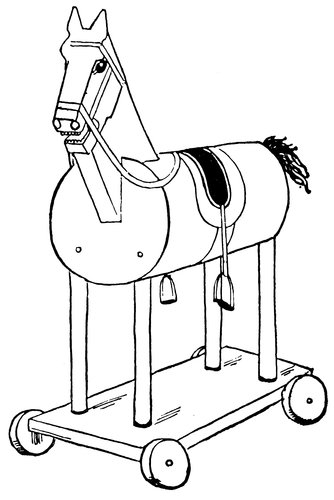
“But I have only been having forty winks,” cried Mister Jack-in-the-box.
“Forty hundred,” corrected Dobbin. “Here comes Mister Zebra, he will tell you I am right in what I say.”
And Mister Zebra did.
“I don't know what will happen next,” he said, tearfully. “I am told that Teddy Bears are always asked for now that no one cares for zebras. I do think it is a little hard. I know Teddy Bears are hairy, but not one of them has a striped coat like mine.”
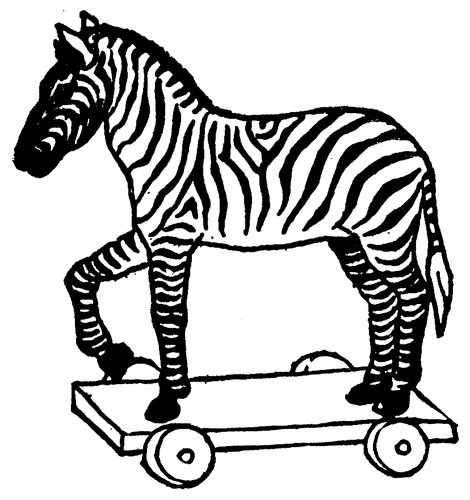
“Look at my legs,” said Dobbin. “No hairy horse ever had legs like mine.”
“I passed a whole new family on my way here,” sighed the Zebra. “There was an elephant that walked without wheels, a boat with sails, a doll with a voice, crackers with toys inside them, a Father Christmas with a real beard, and——”
“A hairy horse!” cried Dobbin.
“A hairy horse,” answered Mr. Zebra.
“Cheer up, cheer up, you boys,” chuckled Mister Jack-in-the-box. “There is plenty of room for us all in the world. Suppose we make a family all to ourselves, just we three old friends.”
And that is what they did.
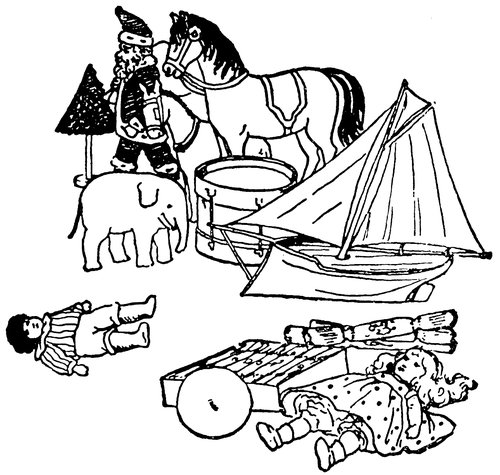
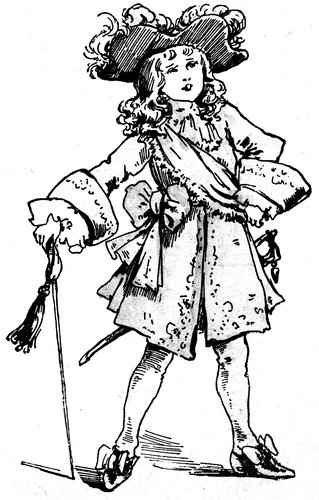
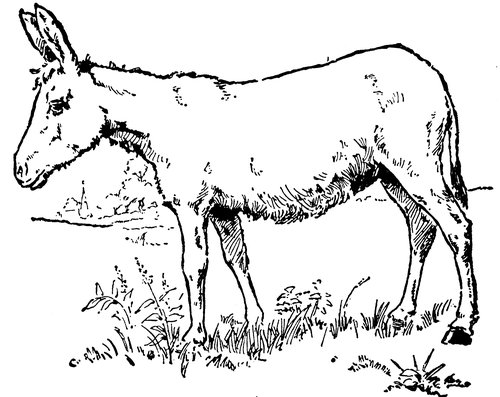
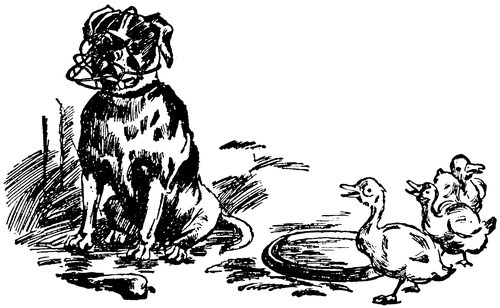
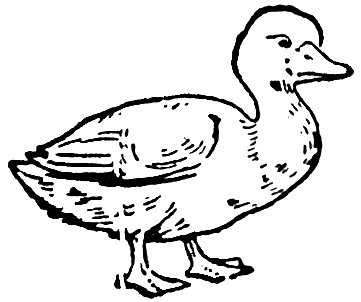
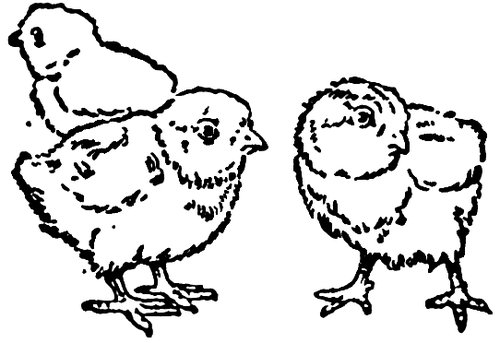
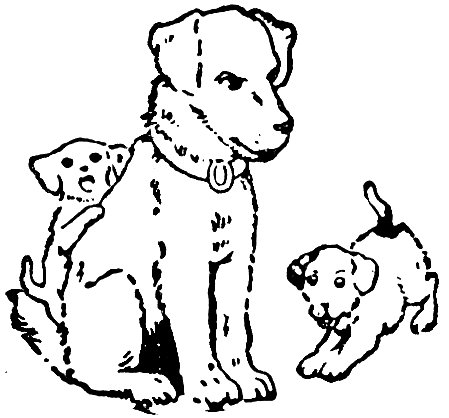
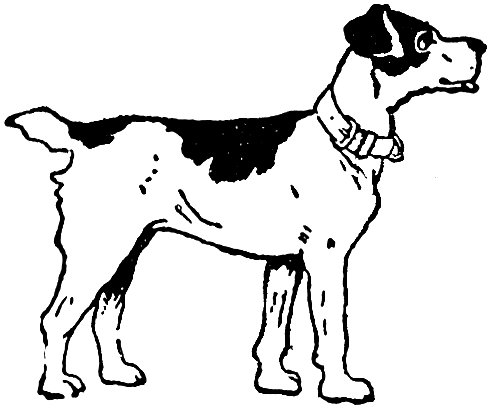
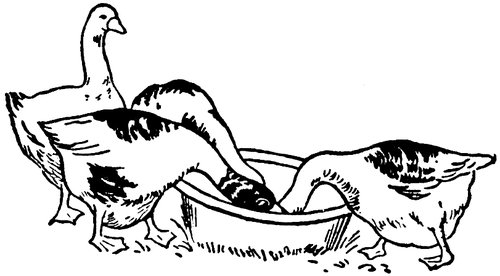
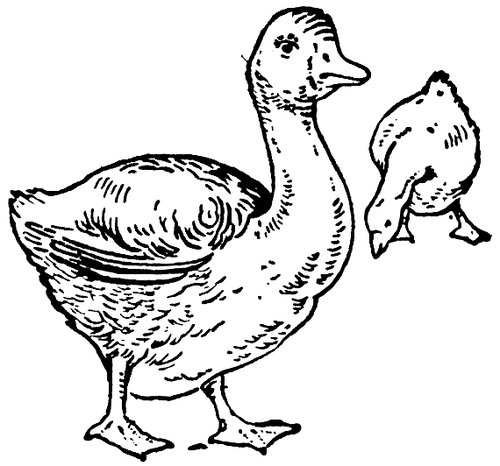
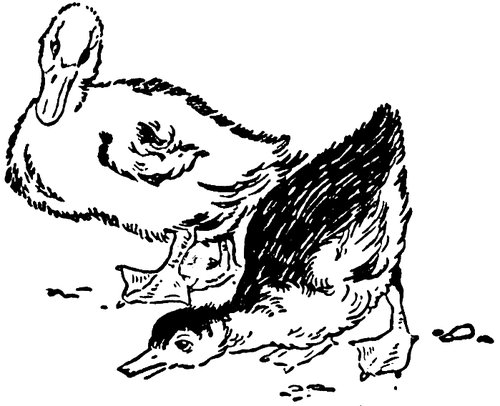
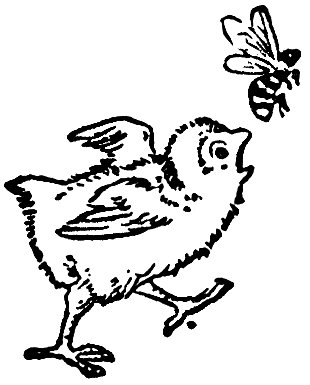
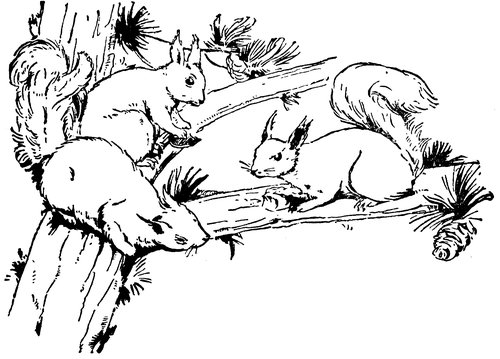
Fir Tree Farm was the name of the big stone house, so the Squirrels thought they could not do better than call their house Fir Tree House, which they did.
There were three of them, Mr. and Mrs. Squirrel and Miss Brighteyes, their daughter.
Every morning at one o'clock they had lunch on the big branch that was very high up, because, you see, they knew very well that James and John were about, and James and John thought it fine fun to chase them. James and John were a terrible pair of pickles, very different to Joseph, the black poodle, but then he was a Frenchman, and he could not bear the ways of James and John, whom he looked upon as common terriers.
They used to bark at him, and make dreadful fun of him when he went out shopping with his mistress, carrying the basket for her.
James and John longed to make him fight them, but he never did, because nothing would make him put down the basket, and no dog can fight with a basket in his mouth.
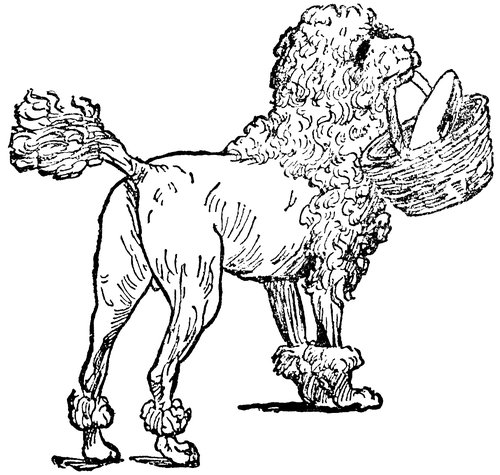
Little Miss Brighteyes rather liked the look of the pickles; she thought James was lovely, with his black and white coat, but she never ventured to go down and speak to them—she was not brave enough for that—but once or twice she threw nuts down on the top of them, and this made them very angry, because they were not at all accustomed to be the ones who were teased.
They used to get into trouble sometimes, and many a good thrashing the farmer gave them, especially on the day when they snapped at the beautiful frills Joseph wore on his legs, and made him drop a basket of fresh eggs. They were rather sorry for themselves that day, and Joseph was so pleased that he did not know what to do with himself.
Poor old Jane, the brown cow, found them a terrible worry.
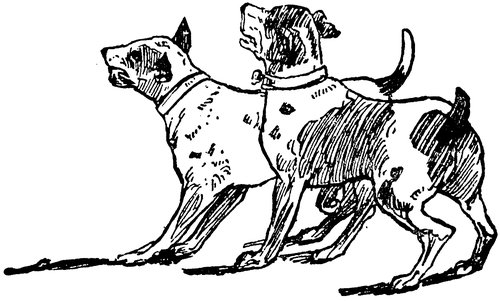
They used to hide in the big wheelbarrow, where her dinner was put, when the grass was poor, and jump up and frighten her when she came to eat it, and they didn't mind a bit when she snorted at them—they rather enjoyed it.
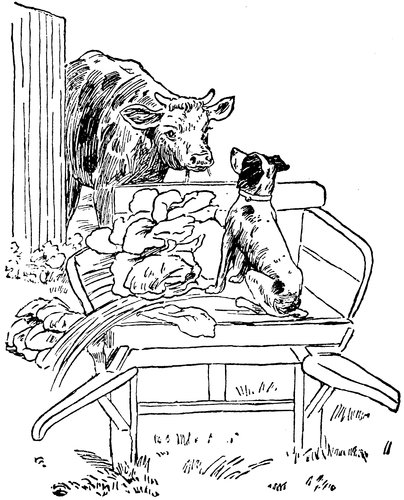
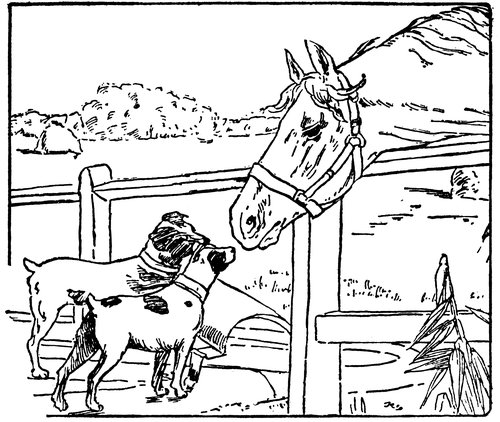
But one day Jerry, the old horse, who lived in the paddock with Jane, spoke to them very gravely about it.
Now James and John had a great respect for Jerry; they thought he was quite the wisest person they had ever met, and when he explained to them how very rude it was to sit in Jane's dinner place, they promised not to do it again.
One day the farmer's daughter came to Fir Tree Farm, and when she went away she took James with her.
John was very sad at first, and Miss Brighteyes felt dreadfully sorry for him; even Joseph tried to be nice to him, but it was Jerry who comforted him best, and gave him good advice.
Then he set to work to be useful, and behaved himself so well that the farmer used to send him to bring the horses in from the fields.
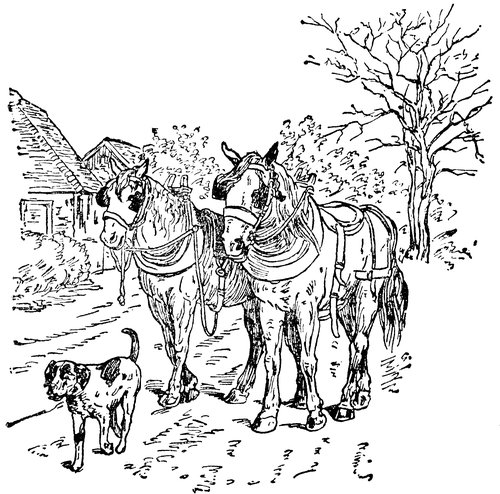
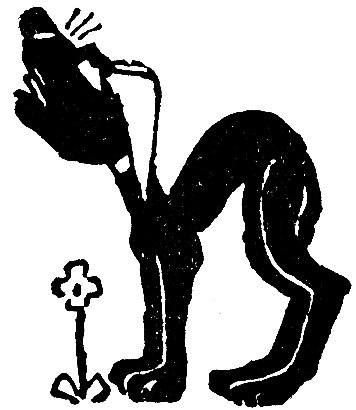
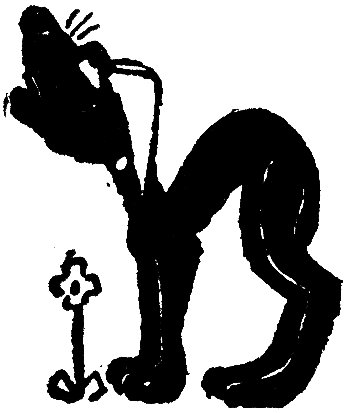
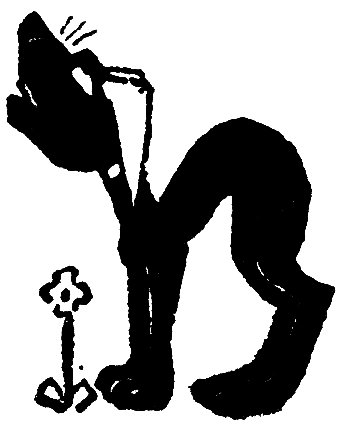
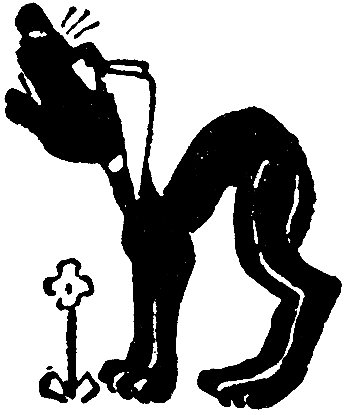
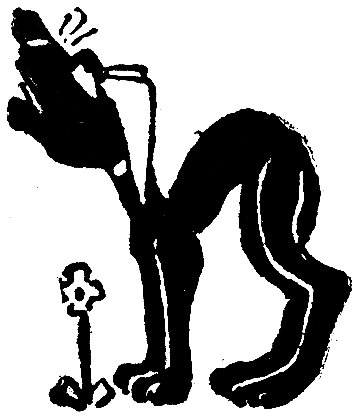
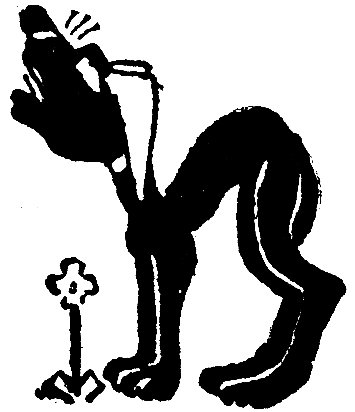
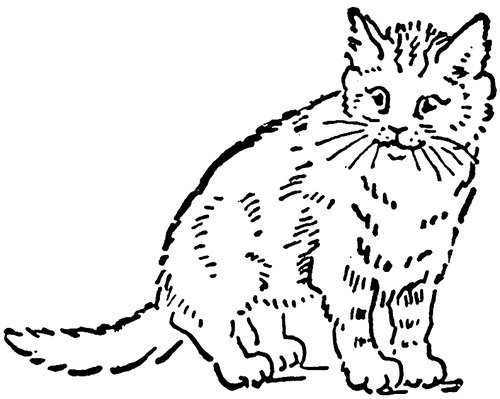
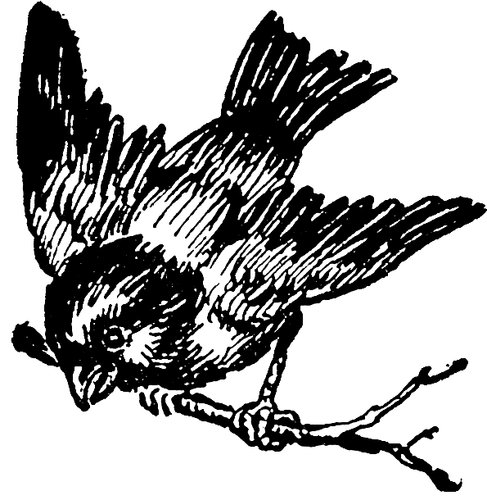
Through a sad misfortune Mr. Northcote's beautiful estate had to be sold up. He was a great rider and lover of horses; but everything had to go, and Firefly, his beautiful bay, was sold with the other horses.
After the day of reckoning Mr. Northcote went abroad. There success awaited him; he worked hard to retrieve his lost fortune, and after a few years he returned to England once more a wealthy man.
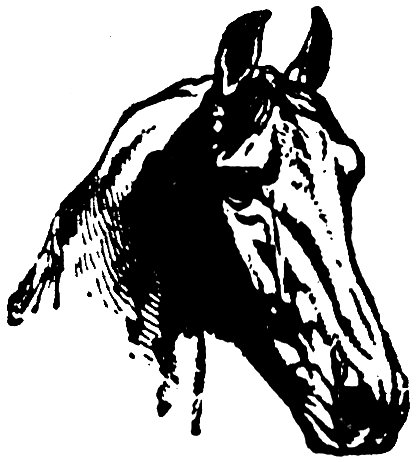
One day he hailed a hansom, and before stepping into it was giving the cabman the address, when the horse grew suddenly restive and uttered a strange whinnying sound.
“What's the matter with yer?” cried the cabman, giving the animal a touch of the whip.
“Don't beat him! He's all right!” said Mr. Northcote, coming to the horse's head.
Again came the strange whinny, and the deep velvety eyes looked into Mr. Northcote's like those of a human being; and they spoke to him, too, as plainly as words could speak: “Dear master! Don't you know me? I'm your poor old Firefly!”
“Firefly! It's Firefly! My beauty!”
And then, to the cabman's great astonishment. Mr. Northcote laid his cheek against the horse's nose.
“To think you should have come down to this, Firefly,” he murmured, with something very like tears in his eyes. Firefly whinnied again softly.
The poor horse had changed masters several times, and had had a hard life the last few years; but all his troubles were over at last.
Of course Mr. Northcote bought him from the cabman, and three months later, when the beautiful spirited animal was galloping round the fields, it was hard to believe he had ever been a cab-horse!
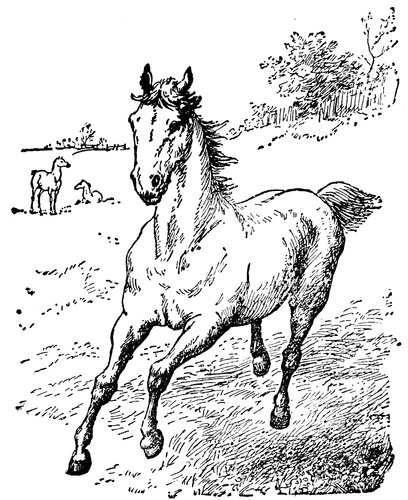
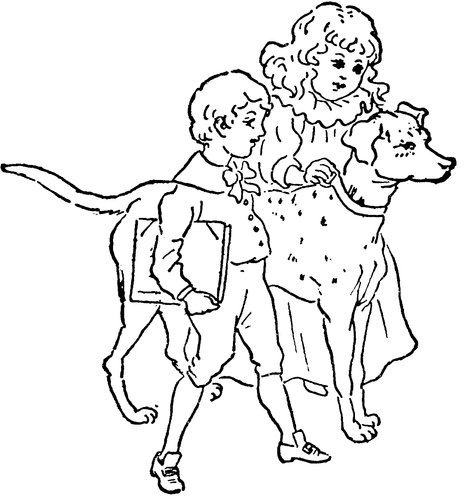
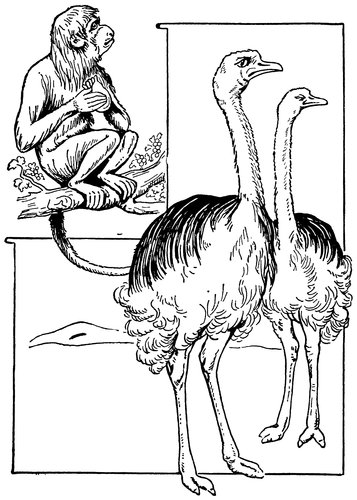
A Monkey.
Ostriches.

Charlie, tired out with play, fell asleep on the nursery rug one winters afternoon. “Hullo, Charlie!” said his sister's biggest doll, walking up and patting him familiarly on the back. “Look,” she said, “there goes the omnibus to Fleet Street; let us go and see if there's room for us.”
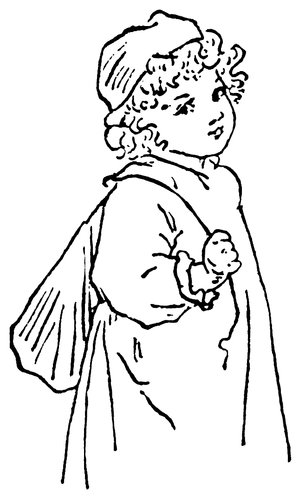
Charlie very soon found himself riding on the top of his toy omnibus, with the conductor driving and shouting, and a wooden doll calling out “Fare, sir; fare a penny!” He drove along too through his own toy village. “This isn't Fleet Street!” he said.
“No,” said the doll; “we are now driving to the Zoo.”
Charlie wondered more and more, but he said nothing until the omnibus stopped and all the dolls got down. He found himself then hustled into a tiny train, the engine of which whistled loudly, and had a piece of cotton wool coming out of its funnel for smoke.
“Here is the Zoo,” said the doll; “and there are the animals going to bed.”
Charlie looked. Why, the Zoo was his Noah's ark, and the animals belonged to it! “This isn't the Zoo!” said Charlie.
At this point up came a very grandly dressed gentleman doll with an eye-glass.
“This gentleman would like a game of nine-pins, Lady Arabella,” he said; “pray come this way,” and he led them to a lawn where a set of nine-pins were.
“Those are my nine-pins,” cried Charlie.
“Nonsense!” said the doll. “They belong to this gentleman.”
“You are a very rude doll,” observed the possessor of the eye-glass to Charlie. “How dare you say my things are yours!”
“So they are,” shouted Charlie; “and I'm not a doll, and you are one, and you belong to my sister, and you are made of wax, so there!”
The gentleman doll grew very angry at this. “How dare you!” he said loudly. “Policeman! hi! Policeman!” and one came hurrying across the street.
Charlie laughed; he recognised one of the little wooden policemen in his toy box.
“Hush!” cried the doll; “the soldiers are coming!”
Marching down the street came Charlie's tin soldiers, all with drawn swords, and most of them on horseback.
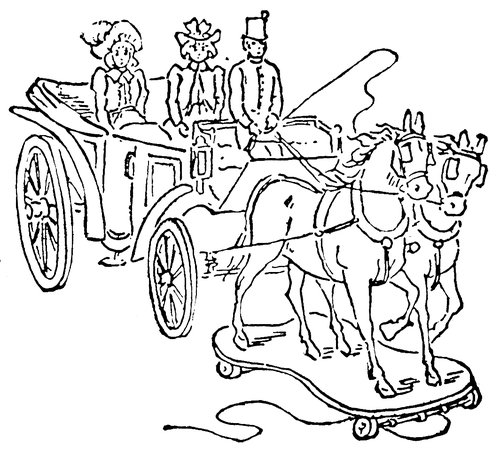
Charlie boldly advancing laid his hand on the bridle of the general's horse. Immediately there was a great clatter of arms, and Charlie would have been cut to pieces if just then he had not woke up to find himself on the nursery rug.
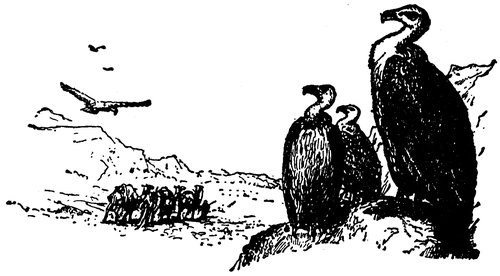
Scavengers of the Desert.
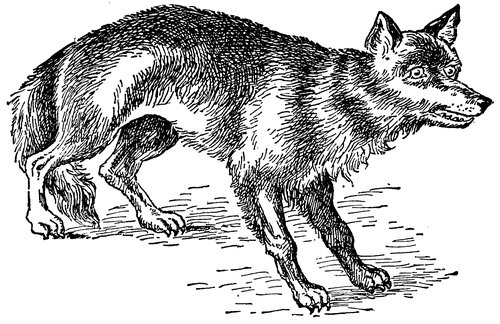
Watching for his Prey.
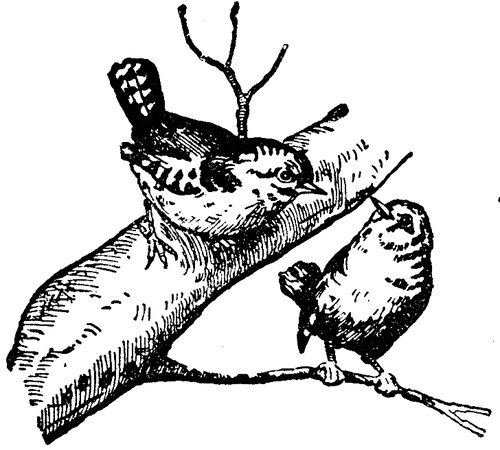
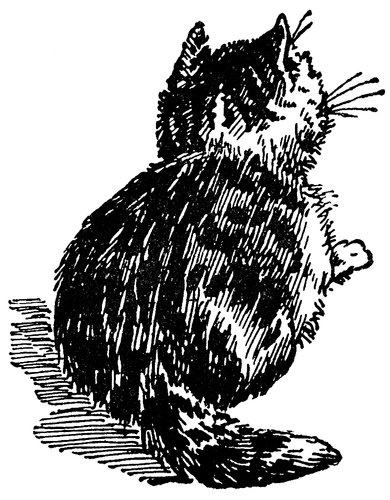
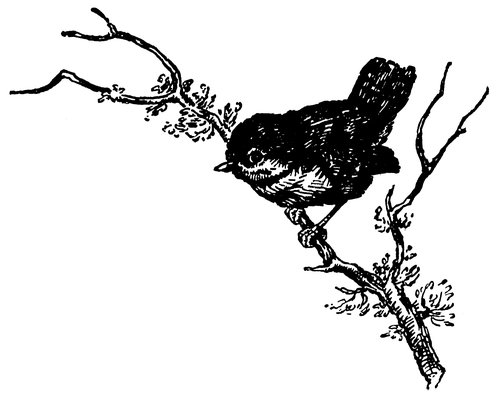

Bobbie was only a little stable lad; the only relation he ever knew was a brother, whose vocation was sweeping crossings. One day, a brougham ran over him, a crowd collected, he followed them to the hospital, and was told his brother was dead. The gentleman, whose brougham it was, came and spoke to him, and then he remembered him taking his hand and leading him to a big house. He was taken to the kitchen and well fed, and after staying there a day or two, was sent into the country.
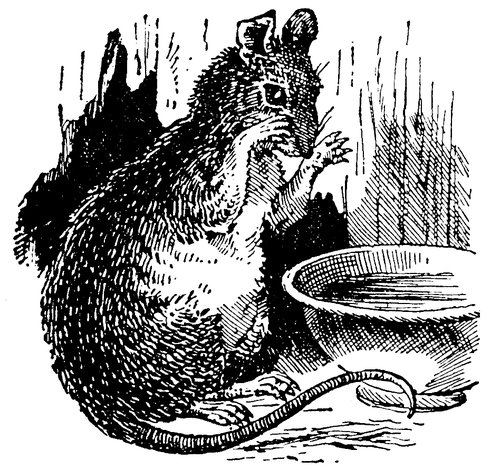
Mr. Wake, after questioning the delicate-looking child, felt he could repay him for the loss of his brother by taking care of him.
The first thing to be done was to send him to one of his farms in the country, where kind but rough hands would do more than smoky town.
The people he lived with grew very fond of him, and treated him in every way as their own.
He had a terrier dog given to him by one of the farm hands, and this he took a great interest in. Now Floss was a good rat catcher, and as rats were most destructive in the barn, Bobbie used to take Floss up there, by the hour together, and hunt them.
One day he caught fourteen rats and mice and laid them at his little master's feet.
On another occasion, they had been waiting some time for a rat, which had made quite a home of three sacks of corn in a corner of the barn, when Floss suddenly darted round and sniffed one corner, and then kept his eyes fixed on something which Bobbie could not see. Floss moved a little on one side, and as the rat made its intended escape, he pounced upon it. The rat was also very sharp, and bit and scratched poor Flossie's face; this worried him so much, that he gave it one dreadful bite, which killed it.
Bob was very kind to animals, and took Floss to bathe his face, and treated him quite as an invalid till his face was well.
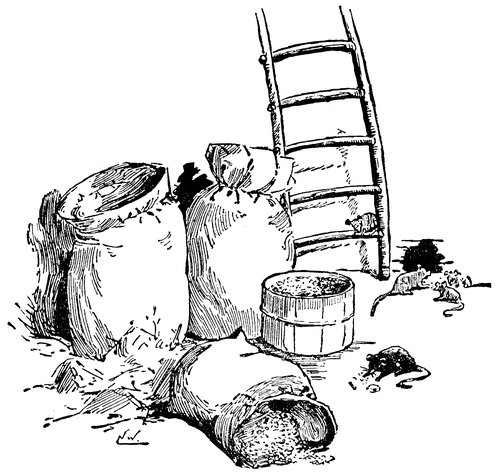
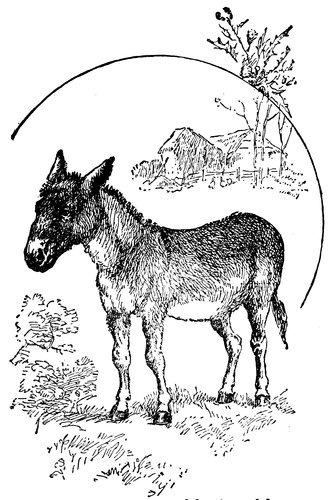
Worrying over his troubles.
The children had been ill with whooping-cough, and as soon as they were well enough they were told, to their great delight, that they were going to stay at a farmhouse by the sea.
“Oh! Mother,” cried Gerald, “do let us take Nip with us! I am sure he would be miserable without us.”
“I thought you would want to take him,” answered Mother, with a smile, “so I arranged with the people at the farm that Nip should go with you!”
The children were overjoyed at hearing this, and rushed out to tell Nip, whom they found lying in front of his kennel wondering what all the excitement was about.
A chorus of excited voices shouted the good news to him, and he wagged his little stump of a tail, and barked so loudly that he made almost as much noise as the children.
A few days later they were settled at the farm, and of course were charmed with everything, and were never tired of visiting the calves, the ducks, the chickens, the pigeons, and the little baby pigs.
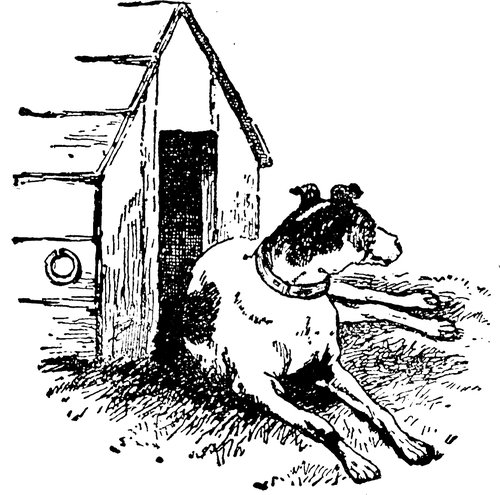
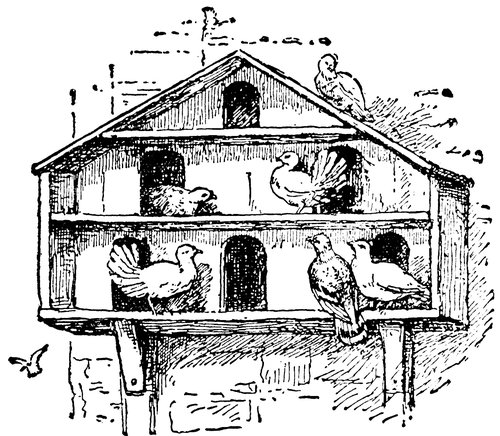
When the children fed the pigeons Nip had to be tied up, to his great disgust, because the birds were afraid of him and would not peck up the grain while he was loose. This, perhaps, was why he took a dislike to the pigeons. “Stupid things!” he would growl. “They can do nothing but sit and say 'Coo, coo!' all day!”
But Nip soon had good cause to change his opinion. One day the farmer was going to market ten miles away, and knowing that he would need to send a message back immediately, he took one of his carrier-pigeons with him. Some hours later the pretty white bird flew down into the farmyard, and, tied to its feathers, the children found a tiny roll of paper containing the farmers message.
“Not so stupid, after all,” thought Nip, with a sniff, and felt a little ashamed of himself.